This page is a continuation of the diary that started in June 2007, with the demise of UCL’s Pharmacology department (for the time being).
It continued from June 2008 to May 2009 on a separate page.
and then from June 2009 to May 2010
Now we continue from June 2010.
Links. Most items on this page can be linked directly by appending the date to the page link. For example https://www.dcscience.net/?page_id=3179#210311 takes you directly to the entry for 21 March 2011.
5 June 2010
It’s rare to have a gig on Saturday, but June 5 was the Annual Conference of Republic. That is an organisation that campaigns for replacement of the monarchy by a proper democratic system of government. I’m not a member of it, and for me it isn’t the highest priority, though I’m sympathetic. The introductory comments by Graham Smith were eloquent. If one thing can persuade me of the undesirability of royal interference, it is the Prince of Wales, because of his consistent, and profoundly unconstitutional, interference in the democratic process. It is he about whom I was invited to speak.
Plenty has been written here about the Prince of Wales, but his most mind-boggling pronouncement was quite recent "I was accused once of being the enemy of the Enlightenment. I felt proud of that." Never before have I heard someone say they preferred the Dark Ages (of course he doesn’t: the comment was mindless and stupid). That made an appropriate start, followed by Michael Baum’s classic letter, “An open letter to the Prince of Wales: with respect, your highness, you’ve got it wrong”. For a US views see Gerald Weissmanns’s essay, Homeopathy: Holmes, Hogwarts, and the Prince of Wales
The meeting was reported in the Daily Express: “Prince Charles is a fruitcake who abuses power“. The quotations of what I said aren’t entirely accurate, but they get the gist of it.
|
8 June 2010. Got train to Birmingham for talk tonight to Birmingham Skeptics in the Pub tonight. Thanks to some excellent publicity, it was standing room only. After the talk I met several people I’d known through Twitter. Back to hotel at 11 pm and recorded a podcast for Patrick Redmond Play the mp3 file (DC is second interview)Back to lab the next morning. |
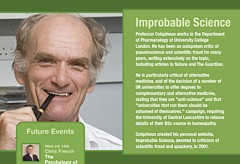
|
11 June 2010. Short interview on BBC Radio Northampton. This followed the News that Northamptonshire NHS Trust had spent taxpayers’ money promoting an alternative medicine fair that promoted angelic reiki, aura photography. "neuromuscular transmission" and horse therapy. Truly the utterly barmy end of the CAM spectrum. A blog post on this will appear soon.
12 – 13 June 2010. Weekend in Dorset, with cousin. Beautiful town, beautiful country, beautiful sea (and fossils) at Charnmouth, Lyme Regis and Bridport.. The Prius did 307 miles at 65 miles/gallon (and that was with two traffic jams. one around stonehenge and the other, as always, on the M25).. Pretty good.
14 June 2010. Invited to a news survey focus group. This was to discuss the results of a survey, and was commissioned by UCL’s "corporate communications" department. I was amazed to find out how few hits UCL News sites get (1500 -3000) per month (about this same as this blog gets per day). There was some discussion of how people are now good at spotting ‘corporate spin, and how excessive spin could actually harm UCL’s reputation rather than help it. I offered the view that we’d be better off if we fired the corporate communications people, and simply offered all academics who want it a lesson in how to use WordPress..
16 June 2010. Went to a UCL."Wellbeing" meeting, largely because it was chaired by Polly Toynbee. Two of the four talks were surprisingly interesting, though hard to see how even the interesting ones actually help anybody. Blog on this topic is coming up. At one edge "wellbeing" means things like angelic reiki.
21 June 2010. Finished at last the pictures from a trip to Switzerland last year. Album is on the photo page for those who like scenery.
22 June 2010. Entry deleted (for now). Legal chill.
23 June 2010. Royal Society Convocation to celebrate 350th anniversary if its founding. There was a huge show in Southbank Centre -Royal Festival Hall. There were a lot of royals there (but,oops, someone forgot to invite the Prince of Wales).
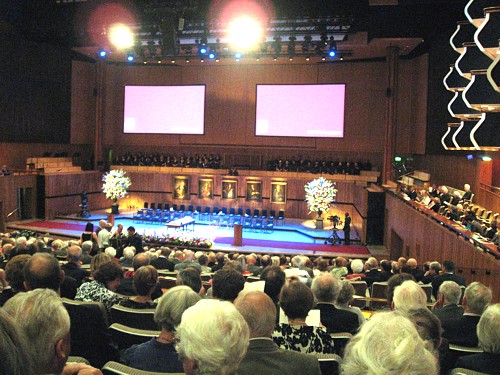
Stage before queen etc came in. Biggest flower display I ever saw
Before the formal stuff, the hall had three radio-controlled ‘air penguins‘ flying round.
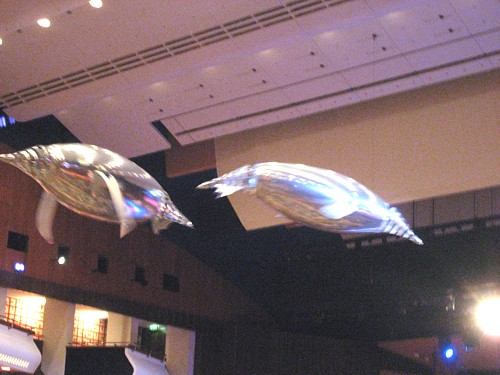
Thy flew over the summer science exhibition too.
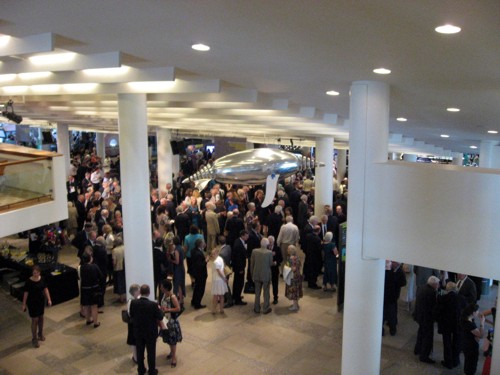
Outside the hall there were some beautiful pterosaurs suspended over walkway.
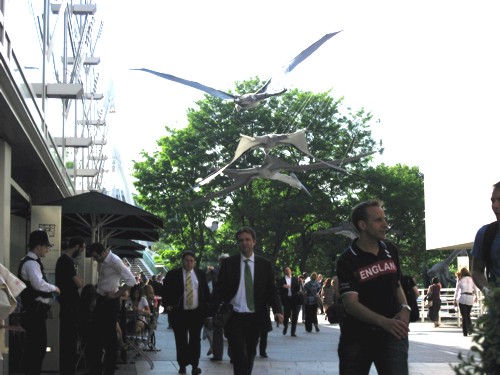
1 July 2010 At Physiological Society meeting in Manchester. Excellent meeting, and symposium on ligand-gated channels organised by Lucia Sivilotti and ex-postdoc Andrew Plested, went very well. It was a particular pleasure to meet again (for first time in 16 years or so) Stephen Sine, of the Mayo Clinic, Rochester MN. He’s an old friend and also our biggest rival in the single ion channel mechanism business. You couldn’t hope to meet a nicer person (and it was great to see that he’d got similar results about partial agonists to those we published in 2008). Only drawback, walking around is s bit exhausting until this damned atrial flutter gets fixed.
2 July 2010. The podcast of the Sense about Science lecture has appeared on The Guardian‘s web site. Fiona Godlee (editor of BMJ) talks bluntly about the problems of vested interests.
8 – 17 July 2010 My colleague Lucia Sivilotti was away at the Ion Channel Gordon Conference in Tilton, New Hampshire. This is the most concentrated gathering of high power ion channel biophysics anywhere in the world. The fact that she was invited to speak about the lab’s work is a considerable honour. Apparently it was a great meeting despite the 38 degree temperature, high humidity and biting insects. But that is New England in high summer.
14 July 2010.Went, at last, to talk to vice-provost research. He invited me to come for a bit of re-education about UCL’s research management strategy after my piece came out in Research Fortnight. It seems that UCL’s Grand Challenges cost around £300k / year and I remain to be convinced that they are good value. Some of the reasons will be laid out in a forthcoming piece about the Wellbeing Business. The rest of the talk with the vice-provost revealed an encouraging unanimity about how to run a university.
18 July 2010. Our senior, and quite brilliant postdoc, Remigijus Lape invited the whole lab to his house for the ‘summer lab meeting’. He, and his wife Roberta, and lab members provided a feast. Quiche, salads, cheese (including montasio) to start, then barbecued lamb chops, Italian sausage and mushrooms. Then spectacular puddings, cheesecake, carrot cake, fruit jelly, superb custard tarts and glorious fruit salad in a hollowed out water melon.
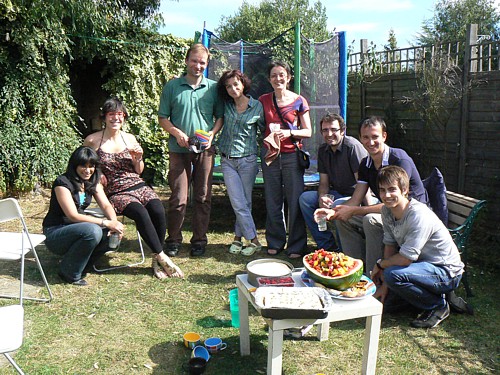
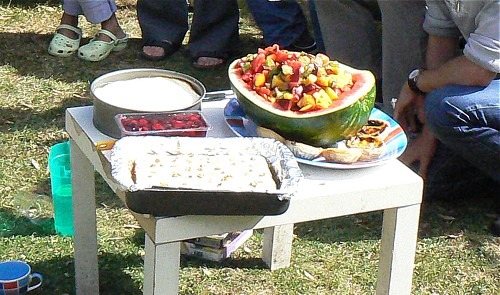
19 July 2010 I’ll be spending my birthday in the London Heart Hospital, getting cardioversion to fix the damned atrial flutter. It worked first time.
20 July 2010 The Provost’s newsletter (3859 words) is more political than usual. It includes a long section that roundly condemns Vincent Cable’s suggestion that a graduate tax is the fairest solution for university funding. Personally I much prefer the more thoughtful assessment of the idea by Kevin Fong. He is a physiology lecturer at UCL, a junior doctor and co-director of the Centre for Aviation, Space and Extreme Environment Medicine. In his column in Times Higher Education he concludes that the graduate tax is the least of all evils, and that the complications of implementing it are not unsolvable. I agree.
29 July 2010. Spent much of the last two weeks on the discussion for a paper on the homomeric α2 glycine receptor. Its analysis present some unusual problems that took a while to solve. In the end it came out well, thanks largely to the efforts of Remigijus Lape and Lucia Sivilotti. The fun part has been to explain in words what the outcome of the fitting process means, in physical terms.
30 July 2010. A lot of indignation caused by an email from procurement, telling people that all travel must be booked through a single travel agent. It was rapidly pointed out that this is the slowest, most inconvenient and expensive way to book a train or flight. I’d like to see a proper costing to check whether the procurement department is good value for money. Judged by this incident, I doubt it.
30 July 2010. Our course on Matrix Algebra for Single Ion Channels starts next Monday (2 August). Once again it was oversubscribed. It is a week of hard unpaid work for everyone involved (Remigijus Lape, Lucia Sivilotti and Andrew Plested), but it gets no support from UCL. It used to be part of the Graduate School, but was ejected, apparently on the grounds that it’s education not training. Courses on advanced powerpoint and self-hypnosis have no such problems. It seems that UCL can afford £800 per day to pay lifestyle consultants to impose psychobabble about NLP etc on unfortunate staff, but not a penny to teach matrix algebra to biologists. I’d have thought that learning maths was the ultimate transferable skill, but HR know better.
The mugs for the course arrived just in time. They were lost in the chaos in the postal system that has followed the imposition of top down management in the Faculty of Life Sciences. This is this year’s design.
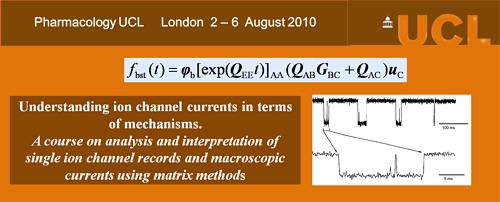
6 August 2010 Last day of the course and exhaustion all round. The last bit of theory was finished, the relationship between single channel currents and macroscopic currents, as derived in the appendix to Wyllie, D. J. A., Béhé, P. & Colquhoun, D., 1998. The rest of the day was spent on practical aspects of analysis. The students were particularly bright this year. The speed with which they picked up the theory was deeply impressive. They should have great careers, if there are any jobs to be had to basic science. Here is the course photo.
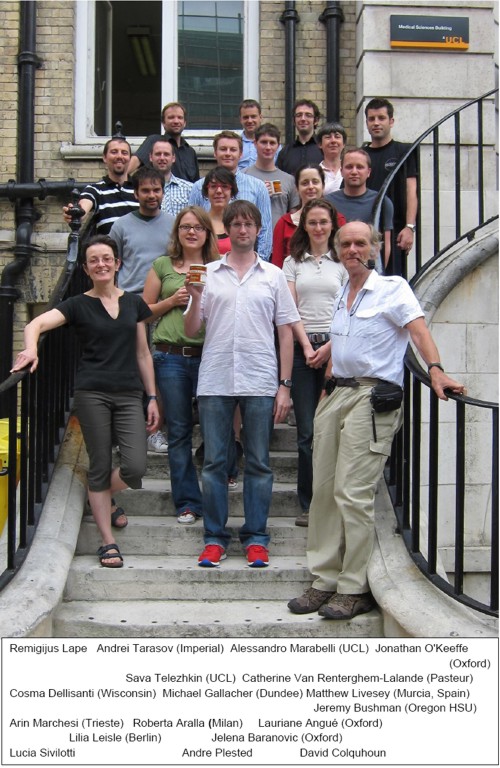
Click picture for high resolution version 1.1 Mb.
7 August 2010. I was alerted on Twitter that I was being misquoted on a Nature blog. One of the contributors to the comments was Brian Josephson, who is one of those people who, after winning a Nobel prize, becomes, ahem, somewhat eccentric. This is a well knowwn phenomenon, though it didn’t happen with any of the Nobel prizewinners whom I have known personally (Huxley, Katz, Sakmann, and, most recently Hunt). Oddly enough, my comment on the blog, as well as correcting the misquotation, allowed me to cite the very same paper, Wyllie et al., 1998, that I was teaching about yesterday.
10 August 2010 Went to appear before board of the CNHC (Ofquack), where, as expected I got fired (in the nicest possible way). Immediately blogged about it.
In the evening I spent some time composing a long comment on Dorothy Bishop’s excellent post on “How our current reward structures have distorted and damaged science”
14 August 2010. Just noticed that UCL has mentioned the HealthWatch award again.
18 August 2010. It has often been said that I’m no oil painting. Well not so. Lynn Bindman has painted me, Lynn is an old friend, She did research and teaching in physiology at UCL . When she retired she trained to be a magistrate. Now she paints (see more here, and here), and works on behalf of the Prisoners’ Education Trust. (Incidentally, she is married to the eminent human rights lawyer, Geoffrey Bindman.)
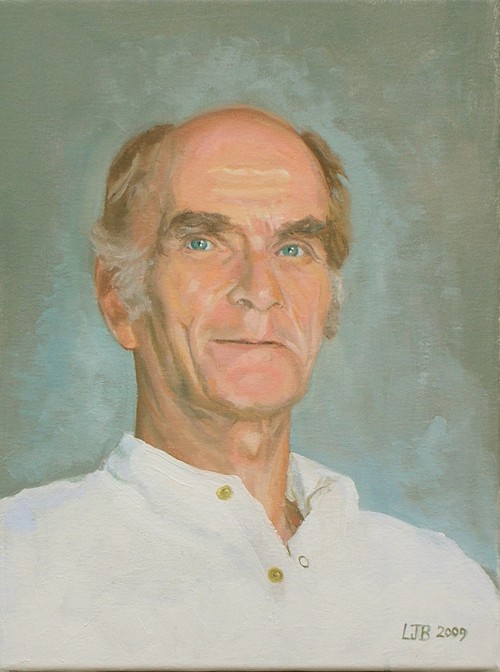
Click picture for bigger version
|
At least this picture is not as unpleasant as one sent to me recently by a ‘John Bon’ who was worried about my karma He said " I have included a picture of Ahriman, your inspiration. I am sure you will recognise him." I suspect that is something to do with my having written in the Patients’ Guide to Magic Medicine "Anthroposophical medicine: followers of the mystic barmpot, Rudolf Steiner, for whom nothing whatsoever seems to strain credulity " That seems to me to be entirely fair. |

|
|
As it happens, though, I did feel a glimmer of recognition for Ahriman. He bears a distinct resemblance to the garden gnome bought by my wife, because she said it reminded her of me, when I’m crouched over a computer. His name is ‘glumpy’. He lives in the garden. |

|
25 August 2010. Took a steam train outing to the Dorset coast. This was my first experiment with geotagging (new Panasonic TZ10 camera has a GPS) so the pictures are in Picasa, not my usual web album. The first few locations had to be set by hand because the GPS is slow to update position.
 |
| Weymouth train |
26 August 2010. Spoke at Winchester Skeptics in the Pub meeting. Arrived a bit late after heroic drive round rain-swept M25 by Crispian Jago, Lovely bunch of people, as always.
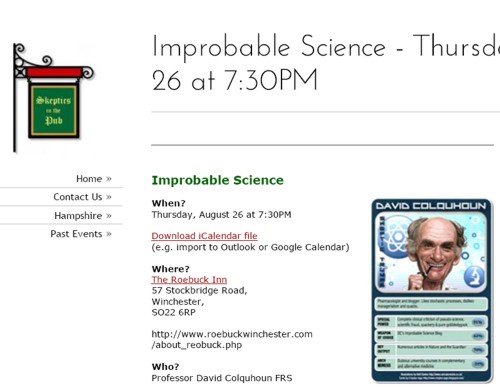
4 September 2010. interesting evenng on Twitter. First the trivial bit, Someone pointed out the “ Homeopathic Medicine Medical Quiz“. I scored 100 percent (OK, like any good quack, I cheated a bit -had to Google a couple of questions). Horrifying really to think how much time I’ve spent in the last few years absorbing this nonsense, when I could have been doing something useful.
Far more interesting I learned something really useful from Twitter. Some tweets form the Science Online 2010 meeting said that pdf files were being deplored by some people. That seems to be the fashion among web gurus and communications people, but not among scientists. How else do you keep your reprint collection these days? More to the point, how else do you get equations on the web. Here are some of the very helpful tweets.
Zeno001: @JoBrodie @david_colquhoun PDFs are getting a bad press at #solo10
DC No scientist hates PDFs. It is how you keep your literature collection RT @JoBrodie everyone but me hates PDFs
Kiwinerd @david_colquhoun hmm yes. A markup language for equations is tricky. The best one IMO is LaTeX.
Michael Grayer @david_colquhoun hmm yes. A markup language for equations is tricky. The best one IMO is LaTeX.
DC One reason I’m not there! RT @zeno001: @JoBrodie @david_colquhoun PDFs are getting a bad press at #solo10
Drunkenoaf: @david_colquhoun XML, done right, saves years of data mining work in lit reviews etc, and is way cooler than pdf viewing on owt not a PC
DC: RT @michaelgrayer: @drunkenoaf XML still hard for equations. The entire web seems to have forgotten that science needs eqns
Michael Grayer: @david_colquhoun hmm yes. A markup language for equations is tricky. The best one IMO is LaTeX.
DC So web isn’t good enough for real science! RT @michaelgrayer: yes markup language for equations is tricky. The best one IMO is LaTeX.
Kiwinerd: @david_colquhoun theoretical high-energy physicists have been using [La]TeX to distribute physics preprints online since 1991! See arxiv.org
Michael Grayer: @david_colquhoun I think you’ve identified a "gap in the market" so to speak: a standard for marking up equations on the web
DC: Sure and easy enough with, ahem, pdfs @kiwinerd: @david_colquhoun theoretical high-energy physicists have been using [La]TeX
Kiwinerd: @david_colquhoun we started with .tex and PostScript files on arxiv.org, and moved to standardize on PDF when that came along. <3 PDFs.
DC. True, though for my level clunky MS eqn editor is good enough RT @RT @kiwinerd: for math, nothing comes close to TeX.
DC Sure, just confirms web isn’t good enough for real science yet RT @kiwinerd: For math, nothing comes close to TeX.. . .
DC. @kiwinerd: I recall when I first started on html, I looked for eqn editor. Shocked to find there wasn’r one. And still isn’t.
Kiwinerd. @david_colquhoun mathML is a decent attempt. But the real problem is that typesetting equations is very complex. LaTeX > HTML.
Kiwinerd. @david_colquhoun http://www.w3.org/Math/Software/mathml_software_cat_converters.html colleague Jacques Distler’s itex2mml is in there…
Michael Grayer. @david_colquhoun @kiwinerd no reason per se why there can’t be a TeX-based standard for web equations. Could prob start out as plugin…
Walkymatt..@david_colquhoun There are various web [La]TeX implementations, eg mathjax as used on stackexchange math and stats sites.
9 September 2010. I keep being told that I can’t criticise homeopathy because I haven’t been properly trained. Well I have got the entire course that used to be given at the University of Central Lancashire, But always eager to educate myself, I took the course offered by the gigantic and mega-rich homeopathic company, Boiron. This time I got 100 percent with no Googling of the answers. That involved some suspension of reason, because most of what I was taught was simply not true. The Boiron course continually talked about micro-dose when it should have said zero dose. I was also told "Dosage is the same for children since the activity of homeopathic medicines is not body-mass dependent". Well, of course not. There is no dose. I now have a certificate.
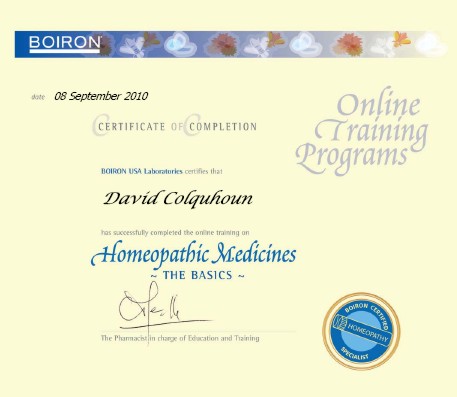
Much more importantly, there was a lot of activity today after a speech by Vincent Cable which threatened huge cuts in science funding, More on that when we get some real numbers.
16 September 2010. More reasons to love the NHS. Yet again we have to say, we love the NHS.

My wife Margaret was recalled on Monday 16th August after a routine mammogram. Ultrasound and X-ray showed a 2 cm mass. After taking advice from Michael Baum, she was referred to the Royal Free Hospital (RFH). In our wonderful NHS you can choose where you want to go. The next day the RFH phoned and on Thursday 19 August she was seen by surgeon. A week later, on Thursday 26 August, a diagnosis of invasive lobular breast cancer was confirmed. For this condition it is usual to have MRI to delineate the lesion(s) so there followed a frantic effort to find out whether the pin used to fix her aneurysm in 1984 was ferromagnetic or not. The National Hospital managed to find the records from 1984, but we were told that any clip put in before the mid-90s was lilkely to be ferromagnetic and so likely to be torn out in a magnetic resonance machine. For that reason she went for total mastectomy rather than lumpectomy. The operation was scheduled for the following Tuesday, 31 August, a mere 15 days after the initial recall. The speed and efficiency was superlative. The next day, 1st September, she already had little pain and seemed happy and normal. Two sentinal lymph nodes were removed too, The following Monday, 6 September, drains were removed and Margaret came home.
Then we squeezed in a short holiday, in Dorset, Devon and then to Plymouth for my annual gig at the Microlectrode
Techniques Workshop, to talk about single ion channels. Then back home via a night at Buckler’s Hard on the Beaulieu River where we had moored often in boating times.
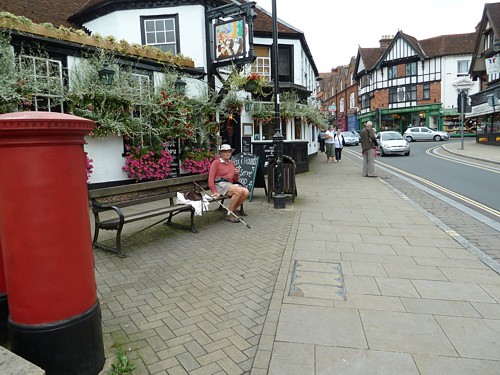
Lunch in Lyndhurst, New Forest
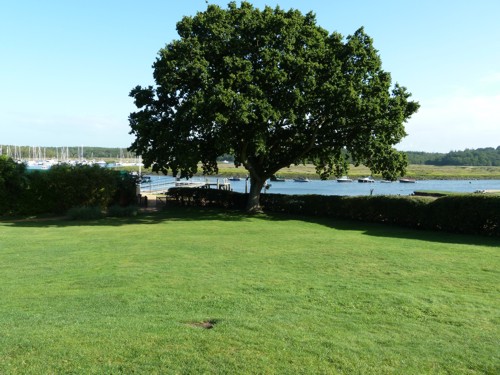
Oak tree, Buckler’s Hard
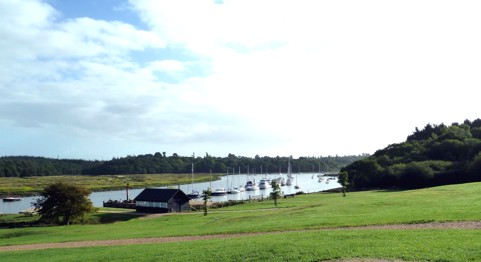
Beaulieu Roiver, Buckler’s Hard
The day after getting back, 16 September, it was back to RFH for the verdict. The sentinel nodes contained no metasteses and the cancer was hormone sensitive. The test for HER2 by immunocytochemistry was borderline so we have to wait another week for the result of FISH test (fluorescence in situ hybridisation), So, no radiotherapy needed. Life suddenly looked better.
Mixed in with this psychodrama, DC had to go to UCLH on September 2nd for follow up CAT scan, after nephrectomy last November. Just before starting my second Plymouth talk, my surgeon phoned to say no metasteses were detected.
It looks as though we’ll both be around for a while yet.
17 September 2010. The pope is visiting. The BBC reports are disappointingly obsequious. Nobody seems to be asking why he still refuses to hand over records of criminal behaviour to the police. Concealing a crime is something that should result in the pope being in court himself. Lot’s of activity on Twitter about #pope. One biting comment was "Pope equates atheists with Nazis. All those who agree please raise your hand" with a link to an old picture.
23 September 2010. Back to Royal Free Hospital. Margaret’s FISH test showed normal HER2, and tumour was ER positive (7/8), i.e. contained oestrogen receptors. Therefore the only treament she’ll need is tamoxifen, which is an oestrogen antagonist. It was discovered by ICI Pharmaceuticals (now AstraZeneca)
24 September 2010. Discussed with solicitors for the General Chiropractic Council (GCC) my complaint against its chair, Peter Dixon. Amazingly the complaint was suggested by the GCC itself. He was in charge of the practices run by the two chiropractors that made false claims on the telephone and might therefore be judged to be responsible for not instructing properly his employees about what they might claim legitimately.
5 October 2010. Still negotiating with the Guardian about when my piece about reorganisation of the university system will appear in the Education supplement. It is based on proposals already published on this blog, but I’d like it to be taken seriously.
8 October 2010. Laurie Taylor hits the nail on the head yet again in Times Higher Education today.
“. . .response of Nancy Harbinger, our Deputy Director of Student Experience, to the new auditing plans unveiled by the Quality Assurance Agency.”
“She cautioned that unless the QAA seriously revised its current intentions, there was a very real danger that it could dent its long-established reputation for sustained ineffectiveness.”
9 October 2010, Went to the Science is vital rally, outside the Treasury. Around 2000 people there and some good speeches. Lots of TV and newspaper coverage, but better (as usual) on blogs. -Colin Blakemore’s speech especially was really good see it here. Walked back though beautiful St James’ Park.
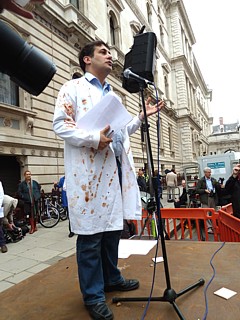 Evan Harris ran the show (in coat with mock blood) |
 Colin Blakemore gave excellent speech. |
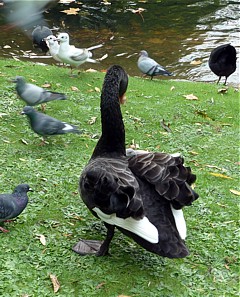 Black swan in St James’ Park |
 Evan Harris,Stephen Curry and DC’s hat |
| MRI scan of my lumbar spine (why I leant against truck throughout) |
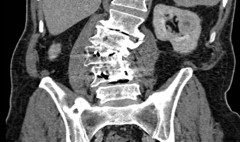
|
12 October 2010. The Guardian was not able to give a date for publication of my piece on how to reorganise universities, so I pitched it to The Times. To my astonishment they used it for the ‘Thunderer’ column. If you can’t, or won’t, pay money to Rupert Murdoch, it is free here. The comments on the Times website were few, rambling and inconsequential, In contrast there was a decent dialogue on the blog. The dead tree media seem a bit moribund.
12 October 2010. Steve Jones’ lunch hour lecture was briiliant as usual. You can watch Incest and folk-dancing: why sex survives.
19 October 2010. The Guardian published a bit of speculative futurology, What will universities be like 10 years from now? I had my say.
20 October 2010. Talk about the day job today, for the Lighthill Institute of Mathematical Sciences.
This was also the day for the Comprensive Spending Review. Teaching in universities has been virtually privatised. A social disaster in my view. The provost’s newsletter, needless, to say, welcome the Browne proposals ane even cited the Institute of Fiscal Studies. Somehow he missed the fact that their graphs show that, depending on assumptions, what you pay back is almost the same regardless of income above about £24k. and that the very rich (top 20%) actually pay less. I think that my proposals could help a bit to ameliorate the social disaster,
Research money is being cut too in real terms. That prompted me to leave a comment on Evan Harris’s Guardian blog.
The biggest problem for most working scientists is “response mode” grants. They are the ones in which an individual with some good ideas applies for money to do the work. Fewer than 20 percent of such applications succeed already, before any cuts. Absurd amounts of time are spent on writing applications that get top ratings, but nevertheless fail to be funded. It is already little better than a lottery.
One reason for the dire situation is that Research Councls have been earmarking large sums for trendy-sounding initiatives. Only too often, this results in work being funded because it fits the narrow specifications of the initiative, rather than because it is first rate work.
I hope that the Research Councils, if they are cut at all, will protect response mode grants.
If the Research Councils reduced their tendency to dictate the course of science, top down, the damage could be minimised.
21 October 2010. The magazine Research Fortnight (not free on the web, sadly) has several articles of interest.
HR staff first in the firing line?
by Inga Vesper sounds optimistic.
"Data from the Higher Education Statistics Agency shows that non-academic staff numbers in the UK increased by 10 per cent between 2004-05 and 2008-09. Of these, managerial staff, who include HR staff, increased by 17 per cent. With spending expected to be cut across higher education, this growth is likely to be reversed. "
Some HR employees in universities are even gloomier. “When push comes to shove academics will think that it’s best to get rid of what they think is superfluous staff,” said one HR manager who did not want to be named."
Well lets hope so.
On the same theme “Time to transform HR in higher education” was written by Ruth Farwell, the vice-chancellor of Buckinghamshire New University
"At my own institution for example, the function of HR has transformed from its former personnel-type role into something based much more around performance management and engagement with staff."
Thank god I dont work at Buckinghamshire New University (though it has to be said that the same tendency exists at UCL). Can’t the vice-chancellor see that performance management is nothing to do with HR? They don’t do the job, they don’t understand the job. Everyone in HR who doesn’t deal with personnel matters should be fired, and the place would run better without them (to paraphrase the words of that "unrepentant capitalist" Luke Johnson, in the FT). More on this topic here.
22 October 2010. Got sent a 36 page report on UCL’s Grand Challenges and Wisdom. It is all very well-meaning but seems to amount to little more than verbiage. It suggests to me one way that we could save money.
24 October 2010. Spent two hours on Skype for an intercontinental board meeting of the Institute for Science in Medicine. Skype handled 8 people (7 on computers, one on land line) superbly, from London to Colorado.
25 October 2010. Yet another debate on funding of homeopathy by the NHS, this time the UCL Students’ debating society. I’m totally bored with the topic, but someone had to do it. I was astonished to find the opposer was my colleague Clare Stanford, She didn’t pretend that homeopathy worked other than as a placebo, but argued that its value as a placebo made it worth keeping on the NHS. That’s the same libertarian line taken by both the Labour government and, so far, by the coalition government, She (and the government) don’t seem to have thought about the dilemmas of alternative medicine. In fact she even cited the totally debunked Montaignier study.
As so often, all the homeopaths in the home counties had been wheeled in, and the motion was lost by a narrow margin, so we have no idea what the students thought. The homeopaths, though, were bitter and angry. I felt a little sympathy for them. After meny years of selling their delusions happily (and usually sincerely) to sick people, suddenly they find the spotlight on them. Both their delusions and their incomes are under threat. They know they have lost the battle and the cognitive dissonance must be hard to bear.
28 October 2010. The Healthwatch award night, at the rather fine headquarters of the Medical Society of London, in Chandos Street.

|
The President of HealthWatch is Nick Ross (the long-time presenter of BBC’s Crimewatch programme). He of made a nice speech and give me a rather grand silver bowl. The list of previous winners is like a list of my heros. One of them. Michael Baum, had given UCL’s lunch hour lecture earlier on the same day. Thanks for giving me such a fine ashtray got a (rather nervous) laugh. |

|
30 October 2010. The uselessness of the Quality Assurance Agency (QAA) in assuring quality is a theme that has recurred often here. For example here. The value of the QAA was dismissed by the chair of the Information Tribunal, David Farrar QC, when the University of Central Lancashire tried, unsuccessfully, to use it as a reason to justify keeping the contents of their course. Laurie Taylor, in Times Higher Education, once again had me laughing out loud.
We are pleased to announce that all members of academic staff have been invited to attend the funeral service for the Quality Assurance Agency, which will be held shortly in a centrally located telephone box.
Those who intend to travel to the ceremony will be required to complete an extensive range of forms indicating their competence in such aspects of the funereal process as kneeling and standing at appropriate moments, familiarity with funeral hymns, capacity for displaying grief and an overall ability to maintain a mournful face.
Prospective celebrants should, however, note that in common with traditional QAA practice, no concrete evidence of competence in any of these areas will be required.
Visit to Sky News to debate with the very angry Dr Brian Kaplan cancelled at the last minute because of the story about exploding toner cartridges (no new information, but endless news coverage).
It is a very bad day for science, evidence and universities. First we hear the coalition is to abandon NICE. They prefer lobbyists for Big Pharma and quacks to rule.
Then it is said that the cap (cap??) on university fees is to be set at £9000, because “several universities threatened to go private”. I am disgusted with the vice-chancellors and with the coalition. My support for Lib dem involvement is rapidly approaching vanishing point.
4 November 2010. To Newcastle for Newcastle Skeptics in the pub. Lovely audience of all ages.
5 November 2010. Talk at the North East Postgraduate Conference in Newcastle. Funny how I often feel I have more in common with a 22 year old PhD student than I have with a black-suited manager.
9 November 2010. Saw excellent NHS consultant for ECG. Normal sinus rhythm, so off anticoagulants for first time in a year. But seems I have a bit of Left Branch Bundle Block -just wear and tear and no big deal,
10 November 2010. To Open University in Milton Keynes, Invited by a cosmologist to talk about "The corruption of science: managerialism and quackery endanger a noble enterprise" Audience seemed very receptive. One theme was the total ineffectiveness of the Quality Assurance Agency (QAA) and Universities UK (UUK, formerly known as the Committee if Vice-Chancellors and Principals). In fact both do more harm than good by defending the indefensible, and failing to condemn rubbish. As usual, Laurie Taylor had it all worked out in Times Higher Education (4th November).
Speaking to our reporter Keith Ponting (30), he commended UUK’s decision to say absolutely nothing whatsoever about the abolition of all public funding for the arts and humanities.
He also praised UUK’s total silence on Lord Browne’s view that student courses should primarily be evaluated by their employment returns.
When pressed by Ponting for his overall view of UUK’s failure to respond in any way at all to any aspect of the Browne Review, he described it as “welcome evidence, in a world of change, of UUK’s consistent commitment over the years to ineffectual passivity”.
It was my first ever visit to the Open University, though I have always felt affection for it because it is such a wonderful institution, and because my PhD supervisor, Walter Perry left Edinburgh in 1968 to become first vice-chancellor of the OU. That was 4 years after I finished my PhD.
|
Perry was one of the world’s most affable men, though it must be said that he left something to be desired as a supervisor. I saw him only when he dropped into my lab for a cigarette between committee meetings. But he did make me an honorary lectureship so i could join the Edinburgh University Staff Club, where I got to know well Peter Higgs (yes, the Peter Higgs). I had no idea that the work he was doing at the time would make him world-famous. The Staff Club exists no longer, having been destroyed by the same sort of philistine managerialism that has engulfed all universities (men in black suits who think communication means email). |
I recall vividly Higgs’ boss, Nicholas Kemmer, standing on a soap box at the Mound, talking at the time of the Cuban missile crisis in 1963.
While at the OU I saw their magnificent TV studios, and got a preview of what looks like a magnificent TV programme, The Frozen Planet. It will be shown in Autumn 2011, and is yet another magnificent achievement of the BBC Natural History unit, with the OU. Don’t miss it.
I also learned that one of the OU’s few failures, course K221 – Perspectives on Complementary and Alternative Medicine, is to close. This course came to light when the BBC, with OU, showed three programmes on Alternative Medicine: the evidence, It turned out that there was rather little evidence in the programme, and that in turn seemed to result from the fact that it hadn’t involved the OU’s Science Faculty, but rather by Health and Social Care, the people who run K221. A dissatisfied student wrote to me about the course, and lent me all the course materials. I wrote them in 2006, in Open University Quacks. Since that time I had a prolonged correspondence with the then Deputy Vice-Chancellor, David Vincent. Unlike many, he would talk. And like most, he did nothing whatsoever. Since then Vincent has moved on and the OU has a new VC. The course is to close and that’s great news. Persistence pays.
11 November 2010 Lots of activity today on the blogging front.
More waste of money? First I get an email drawing my attention to yet another highly-paid non-academic job. The UCL Office of the Vice-Provost (Research) Grand Challenges had an advertisement in the Guardian, for a "Grand Challenges Co-ordinator (Intercultural Interaction and Human Wellbeing)". The pay was only one notch below the professorial level. What they are supposed to do is far from clear (and I have tried to find out). I’m planning a big post on the whole wellbeing industry, but it’s making slow progress, in part because much of what is written about it seems to be vacuous arm-waving in a language barely recognisable as English.
The Royal Society of "Medicine"? A twitterstorm broke out when it was noticed that a chiropractor, John McTimoney, had appeared on the Roll of Honour of the Royal Society of Medicine (RSM). Chiropractic is a form of alternative medicine that has essentially destroyed itself after attention was focussed on its claims after the foolish attempt to sue Simon Singh. McTimoney chiropractic is one sect of the chiropractic cult which has appeared on this blog. Quite a bit has been written about it here.
Many comments quickly appeared on the RSM web page pointing out the absurdity of having a chiropractor on the RSM’s Roll of Honour. An hour or so later, all the comments had been deleted. I wrote to the RSM’s president so ask the reason for this wholesale censorship. Shortly afterwards the web site was altered so ir now says
The Royal Society of Medicine has been made aware of a number of comments made by RSM members and others, regarding the inclusion of John McTimony on the Wall of Honour.
In response to these comments the Society is reviewing the situation and will announce the result of the review on the RSM website by November 18th.
Anyone who wishes to express a view should email development@rsm.ac.uk
.Luckily, though, two snapshots of the pages before deletion of comments were captured, here and, a bit later, here. Some, including my first comment, were missed, but there are quite enough to give the idea (more on the JREF site).
The fact of the matter is that the RSM’s Roll of Honour is nothing to do with honour. It is a receipt for a payment of £2500 to the RSM. This time their rather dishonourable fund-raising gimmick misfired badly.
20 November 2010 Good heavens, my long-time mathematical colleague Alan Hawkes, who taught me most of what I know about stochastic processes, spotted this.

Most-Cited Articles as of November 1, 2010 — updated monthly
Rankings based on citations to online articles from HighWire-hosted articles.
Rankings based on citations to online articles from HighWire-hosted articles.
-
A. G. Hawkes, A. Jalali, and D. Colquhoun
The Distributions of the Apparent Open Times and Shut Times in a Single Channel Record when Brief Events Cannot Be DetectedPhil. Trans. R. Soc. Lond. A September 15, 1990 332:511-538; doi:10.1098/rsta.1990.0129 -
D. Colquhoun, A. G. Hawkes, A. Merlushkin, and B. Edmonds
Properties of single ion channel currents elicted by a pulse of agonist concentration or voltagePhil. Trans. R. Soc. Lond. A September 15, 1997 355:1743-1786; doi:10.1098/rsta.1997.0090 -
Güunter Oberdürster
Toxicology of ultrafine particles: in vivo studiesPhil. Trans. R. Soc. Lond. A October 15, 2000 358:2719-2740; doi:10.1098/rsta.2000.0680 -
D. Colquhoun, A. G. Hawkes, and K. Srodzinski
Joint Distributions of Apparent Open and Shut Times of Single-Ion Channels and Maximum Likelihood Fitting of MechanismsPhil. Trans. R. Soc. Lond. A November 15, 1996 354:2555-2590; doi:10.1098/rsta.1996.0115 -
Denis Noble
Genes and causationPhil. Trans. R. Soc. A September 13, 2008 366:3001-3015; doi:10.1098/rsta.2008.0086 -
Roshan Cools< and Trevor W. Robbins
Chemistry of the adaptive mindPhil. Trans. R. Soc. Lond. A December 15, 2004 362:2871-2888; doi:10.1098/rsta.2004.1468 -
Karl Pearson
Mathematical Contributions to the Theory of Evolution. III. Regression, Heredity, and PanmixiaPhil. Trans. R. Soc. Lond. A January 1, 1896 187:253-318; doi:10.1098/rsta.1896.0007 -
J. Neyman and E. S. Pearson
On the Problem of the Most Efficient Tests of Statistical HypothesesPhil. Trans. R. Soc. Lond. A January 1, 1933 231:289-337; doi:10.1098/rsta.1933.0009
It is certainly tickling to come out ahead of Karl Pearson at number 7 and Neyman & Pearson at number 8. but the main interest is that all the papsers apart from Neyman and Pearson (1933) are, to varying extents, concerned with biological problems. Although Phil Trans A is concerned with mathematical and physical sciences, this may mean only that the number of biologists is now huge.
22 November 2010. Another student demonstration about fees is planned for Wednesday 24th November. We were rather surprised to get today an email from a “senior operations manager” in our security department (I didn’t know they did ‘operations’), to tell us what to do in case of an occupation.
Desk
- Keep own filing cabinets locked
- Remove or Lock up laptops
- Keep desk drawers locked
- Keep a minimum amount of paper on desk
- Plan ahead where the paperwork is to go should the need arise so that you know which drawer, which filing cabinet etc.
- Out of hours operate a Clear Desk Policy
- Know how you will close down your PC and if possible disable it i.e. disconnect and remove/lock away the PC network cable and the power cable
- Ensure you have a lockable desk drawer and know where the key is
Personal Belongings
- Know where they are at all times
- If possible keep close at hand
Office
- Know in advance which drawers, filing cabinets should be locked and prioritise
- All laptops, if possible should be locked away
- Know where you are going to put kettles, tea, coffee, sugar in the event of an occupation
- Be prepared, if possible, to disable photocopier, lock paper away and as much other stationary as possible.
|
Blimey, I think they forgot about covering windows with brown paper in case of a nuclear explosion. Well I’ll have the coffee cups ready to offer them a cup if they arrive. Oh dear. I only just noticed it says at the bottom.
OK I made up the last sentence. But it does worry me a bit that we are paying people to write this sort of rather pathetic stuff. |
 My clear desk policy |
24 November 2010 Drove to Cambridge to talk to signal analysis mathematician. Excellent lunch in Christ’s College. Lots of normal-looking academics in dining hall, but one man in pinstripe suit and rimless glasses, I asked if he was the vice-chancellor. “No, he’s the butler”. Nice to see how the other half live.
Meanwhile UCL students had occupied the Jeremy Bentham room. Went to see them next day. friendly cheerful bunch, all blogging and tweeting. Signed their petition (with only slight reservation). (
26 November 2010. I see that we now have a new head of HR, Nigel Waugh. While hoping for the best, his introductory statement doesn’t give much hope for any substantial departure from the Laurie Taylor caricature.
"The challenge for Human Resources in any organisation is to create and maintain value through the provision of professional practices that build competencies that align with and help accomplish the organisation’s goals."
It seems to be a persistent delusion of HR than they have something to contribute to science. Talking of which, yet another excellent broadside against HR’s favourite brand of psychobollocks, NLP, has been fired off by Donald Clark, NLP – training’s shameful, fraudulent cult. Recommended reading for Nigel Waugh.
27 November 2010. Much of the day was spent trying to get signatures on a letter to the newspapers about the university fees problem. Not easy on a Saturday. So far one FRS and one Nobel prizewinner. The letter was drafted by Michael Collins (lecturer in 20th century history at UCL) with some input from me Its proposals are based on Collins’ excellent piece on the Open Democracy site, We need a Public Commission of Enquiry on the future of higher education (see also his earlier piece, Universities need reform – but the market is not the answer, and my own proposals).
30 November 2010. Another talk show Interview, on BBC Northampton. This one was quite fun, It was about a German study which the host, Stephen Rhodes, introduced as showing that acupuncture relieved pain. In fact it was an imaging study that didn’t measure pain and showed nothing relevant to whether acupuncture works. Here’s a recording of it.
(The mp3 file is streamed with the WPaudio plugin for WordPress -works wonderfully -the 15 Mb file starts playing instantly.)
2 December 2010. Bugger. No sooner was warfarin dose tapered to zero than another DVT hit left leg. This time it’s higher (above knee) and unlike the first, painful. So back on warfarin, probably for life this time. Walking is hard at the moment. I just hope it improves. I guess this means it would be silly to fly to Baltimore for the next meeting of the Biophysical Society. Pity because it’s one of my favourite meetings. The pain might help to explain the irascibility of the post on "Paths to impact". But you don’t need a painful leg to feel irascible about the betrayal of science by the people who are meant to be its guardians.
Echogenic thrombus was noted in a non-compressible left popliteal vein extending proximally into left superficial femoral vein just above the adductor hiatus. No flow was demonstrated in these vessels on augmentation. Imaged portions of the left common femoral vein are compressible.
6 December 2010.Hobbled into work, for hospital appointment. The Slade School of Art is now occupied too. The signs are quite, eh, artistic.

9 December 2010. The day of the parliamentary debate on the 80% cut to teaching funding to universities, and trebling of fees. Shamefully, given their pre-election pledge, 28 lof their 57 MPs voted for the motion, though 8 abstained and 21 voted against. If the 28 who voted for the motion had abstained, it would have been defeated. Nicola Miller, head of History at UCL, appeared on Chennel 4 News to explain to a Tory MP. Damien Hinds. the harm this will do to the teaching of humanities. Watch it here.
Hinds maintained that the prospect of being in debt by £50,000 or more would not deter potential students. Most people now can’t afford a mortgage on a house, never mind what amounts to a second mortgage. University teaching has almost been privatised by this iniquitous Bill. Since it isn’t even cheaper, the aim seems to be ideological. It seems unlikely that the matter will be forgotten quickly.
10 December 2010. A hilarious piece in the BMJ by the excellent John C. McLachlan of Durham University. He’s now the Alan Sokal of “Integrative medicine”.
15 December 2010. Still stuck at home with damned DVT. Quite hard to be cheerful when university teaching has just been almost privatised, by a philistine government. Since it is now clear that trebling fees will neither generate income for universities, nor save money for taxpayers, the changes must be ideological. They would not have passed if all Lib Dems had abstained. Paddy Ashdown, for whom I used to have some respect, sounded like a Tory in the Lords’ debate. The only bit of fun this week was cancelling the standing orders to the Lib Dems. Traitors.
Finished formatting Part 3 of the Steiner school guest posts. It’s a really scholarly work and deserves a lot of publicity. Up now at https://www.dcscience.net/?p=3853
Twitter produced some gems, and some heated arguments.but the best find came from Orac, Sadly, this is not too far from the truth for my basic science colleagues…. The video, Academia vs Administration, is a chillingly accurate dig at the enormous harm being done to science by dimwitted “managers”.
16 December 2010. Struggled into the lab. largely because of the BMJ Christmas party, Since writing a Christmas editorial last year, I seem to be on the list and, as always. met a lot of very interesting people. Got into a discussion with the editor, the excellent Fiona Godlee, about patient-centred medicine. and promptly got commissioned to write 800 words. This may be the chance to finish a long-planned post on the wellbeing industry.
17 December 2010. Made it into London again for my lecture to medical students at King’s College London. I’m asked to familiarise them with CAM, to fulfil the GMC requirements. It’s fun and well received. I was surprised (and delighted) to find that two staff members of the MHRA were sitting in on the talk. If nothing else, it was a chance to remind them that the MHRA has been sitting on my Esperanza complaint for almost a year now. Given that it is one of the most cruel and most obvious scams it has even been by displeasure to encounter, that seems to me to be excessively slow.
24 December 2010. The snow and cold persist but main roads are clear now, so mother-in-law, now 89, was driven safely from the far side of London for the holiday. My INR is in range at last. Everything is for the best in the best of all possible worlds. For a couple of days anyway. Voltaire was so cool.
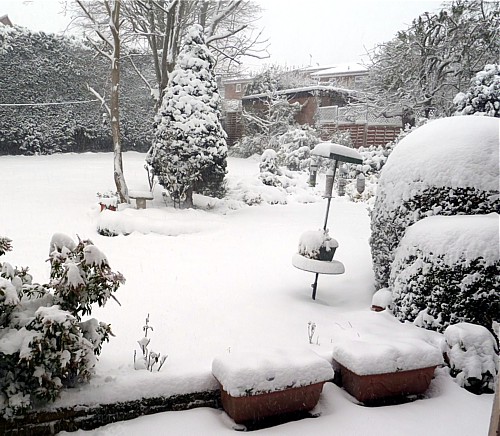
Picture taken 18 December and still much the same
Watched A Christmas Carol for the second time in two days. first the 1999 version, then the 1951. Tears well up towards the end every time. if only it were true. Soon we’ll be back to battling two-neurone Willetts and the government’s clever scheme in which everyone loses. The taxpayer loses (or at least gains very little, according to HEPI). Universities lose. And, above all, students lose. Scrooge couldn’t have done better. It’s a triumph of ideology over common sense.
Times Higher Education tweeted "If you could give one present to a notable HE figure, what would it be and why?". My response was
"A proper job for postdoc Remigijus Lape. Worth 1000x any VC RT @timeshighered: If you could give one present to a notable HE figure . ."
Brilliant postdocs like him are the people who do the work on which the reputation of places like UCL depends. It is people like him who support the whole superstructure from HR to vice-chancellors. The near total removal of responsive mode funding has made their career prospects quite ghastly. The one thing that could be done them has not been done. All they have is the absurd and vacuous "concordat". That adds insult to injury. I really would not recommend anyone to start in science research under the present conditions.
And now, more cheerfully. this year’s best card.

The Guardian’s birthday column on christmas eve was a bit out of date. My son Andrew had to leave serious cricket because of a shoulder injury, almost four years ago.

6 January 2011. Twitter has its uses. After writing the post about A.V.Hill I heard from his granddaughter who happened to be in London today. She came round for lunch and we had a fascinating conversation.
9 January 2011. First Sunday walk of the year. Too damned slow and painful, But did see amazing pattern of morning frost on a wooden picnic table.


11 January 2011 Walking back from lunch through the cloisters, I stopped to look at the "research images" exhibition. There are some pretty pictures, but no real science. The scary bit was the captions. about half of which would find a good home in Private Eye’s “Pseuds’ Corner” column. What on earth does this one mean? (I mercifully removed the name of the author.)
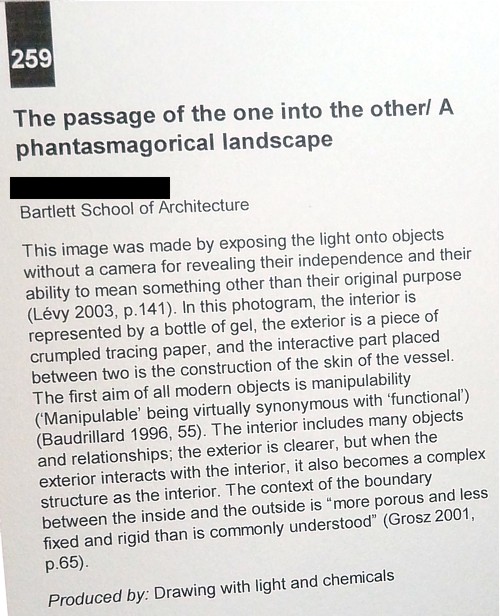
18 January 2011. Sigh, Another of those managerial wheezes has landed on the desktop. What it is meant to mean is quite obscure. The head of the biosciences division, asked what "discovery science" means, said "Discovery Science is a recently evolved terminology for basic or fundamental science.". There’s a great leap forward. If that is what it means, why is it at right angles to "Basic Life Sciences". And why is neuroscience separate from basic life sciences? It makes so little sense that most recipients will doubtless simply sigh and reach for the trash button: ‘just another managerial wheeze that will result in endless meetings and no improvement in knowledge’.
This is described a "matrix", but it is nothing to do with the mathematical matrix. You can learn about the real thing on our course http://www.ucl.ac.uk/Pharmacology/matrix.htm
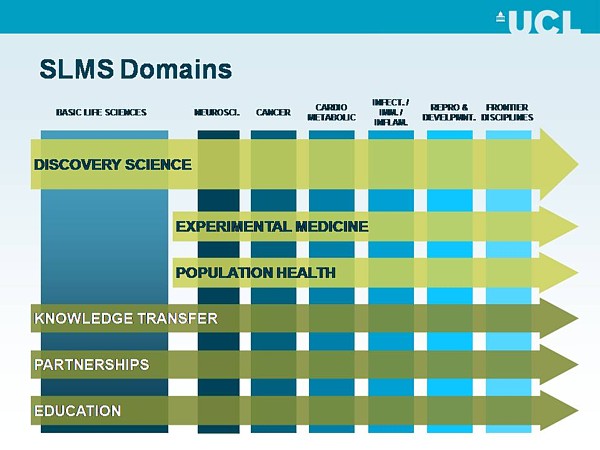
25 January 2011
|
Yet another collective sigh ran round the Faculty when a manager sent an email that advertised a lecture by Rupert Sheldrake. On the off-chance that you haven’t heard of him, he coined the term “morphic resonance”, and has no doubt made money from it. |
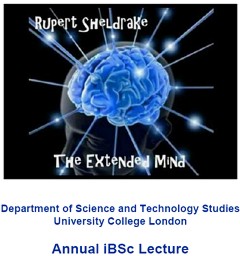
|
The Skeptic’s Dictionary entry on ‘morphic resonance’ says
” . . .his continued pose as a scientist on the frontier of discovery is unwarranted. He is one of a growing horde of “alternative” scientists whose resentment at the aspiritual nature of modern scientific paradigms, as well as the obviously harmful and seemingly indifferent applications of modern science.”
This invitation came, sad to say, from our very own Department of Science and Technology Studies. That department is (wait for it) part of the Faculty of Mathematical and Physical Sciences. Well, there is some maths involved. The department member who sent the invitation is on record as saying
"Among the topics that influenced Picasso’s creativity towards Guernica, I emphasized the role of non-Euclidean geometries and the debate concerning the nature of space and time, a notion of psychology of form and the development of modern technologies of warfare".
Non-Euclidean geometry? All the warning signs of postmodernist pretentiousness are visible here. She writes
"Jarry’s writings contained sophisticated references to non-Euclidean geometries, the relativity of scientific knowledge and the value of scientific imagination"
The term “sophisticated” here sounds as though it might be translated as ‘it sounds good though i don’t know what it means’. Alfred Jarry was a writer, not a scientist or mathematician, so he probably didn’t know what he was talking about himself. A reference to
“. . . geometries that exceeded the three-dimensional Euclidean system”
suggests strongly that she hasn’t the faintest understanding that Euciidean spaces can be of any dimension.
All this sounds very like Alan Sokal’s famous spoof that revealed the baselesness of postmodernists’ mis-use of scientific and mathematical vocabulary. Sokal’s essay Pseudoscience and Postmodernism: Antagonists or Fellow-Travelers? is particularly relevant. This is the sort of stuff loved by the more pretentious sort of homeopath (see, for example, Deconstructing the evidence-based discourse in health sciences: truth, power and fascism.
It is, I suppose, too much to hope that any university will be totally free of antiscientific nonsense, though one doesn’t expect it to come from a Department of Science and Technology Studies. The only other cases I’ve come across are UCL’s psychoanalysis unit and a small cell of enthusiasts for Luce Irigaray, centred in the Bartlett School of Architecture (“sexuate architecture”).
Last night, in desperation, I wrote to the head of the epartment of Science and Technology Studies.
"Good heavens
I have just seen that someone has invited that well know crackpot Rupert Sheldrake to lecture to intercalated students. That can’t be serious. It could bring UCL into disrepute.
I recommend http://www.skepdic.com/morphicres.html
Please tell me this is an exercise for the students in how to detect pseudo-scientific chancers."
So far, I haven’t had a reply. If I get one, it will appear here.
I’m told that the advertisement for this lecture has vanished from the UCL web site, but the invitation is still there in Google groups.
Update I have now been asked to give a lecture on the same course.
27 January 2011
I just got sent a picture that was taken at the Healthwatch award on 28 October last year. Me getting the bowl from the great Nick Ross.
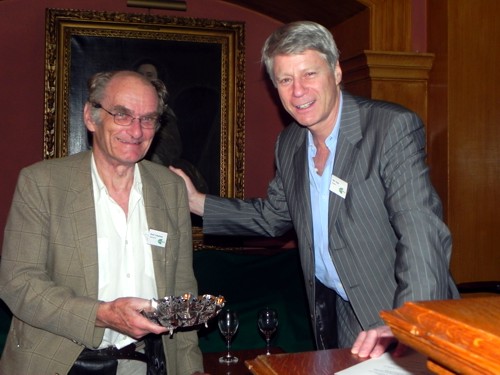
28 January 2011
I see that there has appeared on YouTube a short interview that I did for BBC News Business, about the new Herbal medicine regulations.
BBC Business News 16 January 2010 with Nigel Cassidy.
Pharmacist earnestly makes totally unfounded claims for echinacea and goldenseal. He makes unsubstantiated claims for treatment for menopausal hot flushes.
MHRA man evades the essential point -fraudulant labelling.
I point out that it is a disgrace that there is still no indication of whether treatments work.
The government and the MHRA bend over backwards to support producers, at the expense of consumers who get saddled with useless products.
29 January 2011. At last, something to make you laugh out loud (before you start to weep). Dr Aust has produced a wonderful list of HR and management bollocks at Take a Deep Breath. Here’s one of my favourite bits.
One of Dr Aust’s former Faculty Deans, a genuinely nice and usually impeccably down-to-earth bloke, once had a rush of blood and told a Faculty meeting in apparent seriousness that he thought our new Faculty watchword should be:
“To Infinity – AND BEYOND!”
[This was many years ago now, when the movie Toy Story was just out].
A spate of alternatives soon emerged in the corridors and tearooms, as such things will:
“To Inanity – AND BEYOND!”
“To Insanity – AND BEYOND!”
And finally, one which comes back to mind especially in these latter days of uncertain University finances:
“To Insolvency – AND BEYOND!”
2 February 2011. Two bits of potentially bad news. I hear there is a plan for a Faculty of Neuroscience, as part of the clinical faculty. This ignores that there is no good definition of neuroscience, Where does basic biophysical work like ours fit in? Is it neuroscience? One receptor we use, the glycine receptor is found in the central nervous system. The other (the muscle type nicotinic receptor) is not part of the nervous system at all. I fear that if this plan went ahead, basic work of our sort would be totally marginalized. We’d get yet more "new phrenology", no doubt.
Then I heard that the Housman room, our beautiful academic staff common room, may vanish. It seems we’ve been offered a house in Gordon Square. if that happened we’d never see a mathematician or physicist again. I’m not (quite) sufficiently conspiratorially-inclined to think that the aim of the move is to prevent academics from talking to each other, in case they make trouble. I do think it means that we are being run by people who have no idea how universities work. The people who dictate these matters don’t do research and are never seen in the Housman room. How would they know?
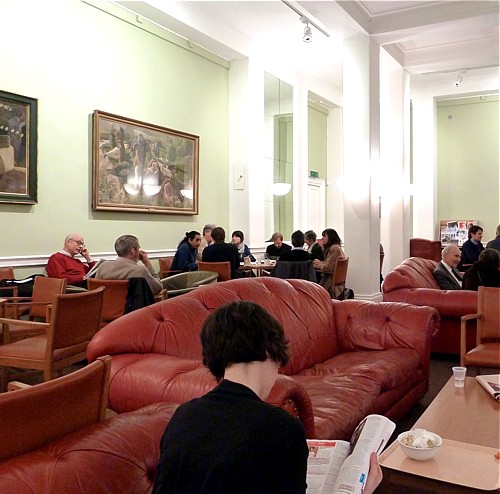
4 February 2011. A video that debunks the absurdity of “water ioniser” scam. It gives you a dose of drain cleaner and bleach. The scam artist, Peter Goodchild, threatened to sue and suppressed the video. The video has now been mirrored by P.Z. Myers’ enormously popular Pharyngula blog. Give it all the publicity you can.
.
This is the embed code
<object style="height: 390px; width: 640px"><param name="movie" value="http://www.youtube.com/v/BTMXMuVAOmE?version=3"><param name="allowFullScreen" value="true"><param name="allowScriptAccess" value="always"><embed src="http://www.youtube.com/v/BTMXMuVAOmE?version=3" type="application/x-shockwave-flash" allowfullscreen="true" allowScriptAccess="always" width="640" height="390"></object>
7 February 2011. Had lunch with Jeremy Howick, the person who invited Rupert Sheldrake to speak at UCL. We didn’t reach any agreement about the desirability of this, but I was invited to talk to their students on March 1st. I can promise that the dreaded words “Kuhnian paradigm” won’t pass my lips (except to debunk their pretentiousness).
8 February 2011. Got up a post on a bad exhibit at the Science Museum -sad. And saw latest paper in final version, at last. Less cheeringly, I read an article in the US Chronicle of Higher Education, Shared Governance Is a Myth. It shows that the culture of phony consultations and disempowerment of academics is very much the same in the USA as it is in UK.
14 February 2011. Came across two good quotations about the philosophy of science (used in Goldmiths’ talk tomorrow).
"Philosophy is of value to science in the way that ornithology is to birds” (Richard Feynman)
"philosophy is to science as pornography is to sex: it is cheaper, easier, and some people seem, bafflingly, to prefer it" (Steve Jones, UCL)
15 February 2011 Went to Golldsmiths’ College for first time, at invitation of Chris French of the Anomalistic Psychology Research Unit. Added a section to the talk on how some philosophy of sciencee would harm progress rather than help it if scientists were aware of it. Luckily they are not.


18 February 2011. In the context of Chinese Medicine at the University of Westminster, I showed some scepticism about the results that have been achieved so far in Systems Biology, despite the enormous amounts of money poured into the area by the BBSRC. One wishes the research councils were a bit less besotted with buzzwords. As a result of that, I got today a reprint of an article by Athel Bornish-Bowden. "Systems Biology. How far has it come". It’s a fascinating account from a distinguished biochemist. And worth it alone for the quotation from the legendary Sydney Brenner.
Sydney Brenner describes systems biology as “low-input, high-throughput, no-output biology”.
Up to now, that just about sums it up.
22 February 2011. To Edinburgh again, for long-arranged talk to students’ pharmacological society (and anyone else who wanted to come). Last minute change of title. to Department of Health, some vice-chancellors, and other pinheads. It feaured the recent decision at the Dept of Health to support the herbal industry rather than the interests of patients.
The talk was held in Edinburgh’s beautiful old Anatomy lecture theatre (in use since 1877), in the old Medical School in Teviot Place (where I did my PhD).
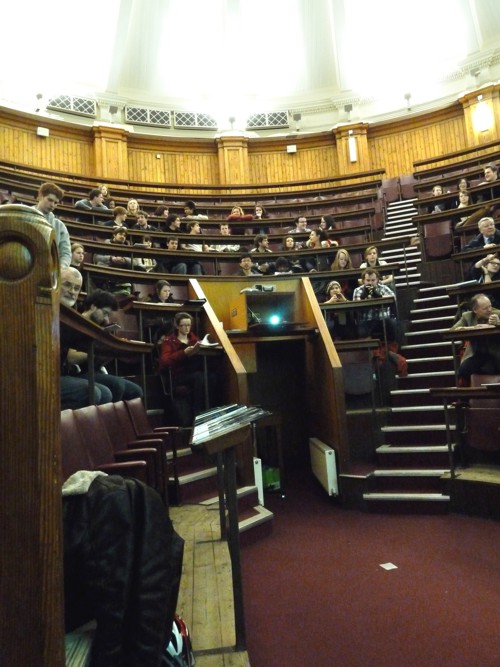
Another picture, from here
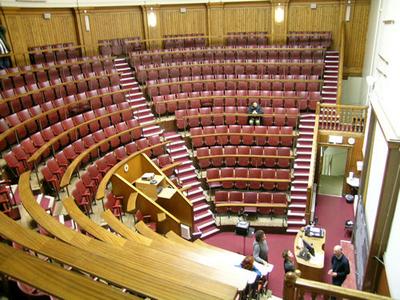
24 February 2011 Yet again, Laurie Taylor sums it up. His comment on UUK on this weeks Times Higher Education is pretty close to what I said in the Edinburgh talk.
Our vice-chancellor has expressed “deep shock” at the news that student activists intend to picket this week’s meeting of Universities UK.
In an interview with our reporter Keith Ponting (30), he said that he found it difficult to see why the UUK was being singled out in this manner. “Apart from sending an open letter urging MPs to vote for the increase in tuition fees and apart from sucking up to Russell Group members who favoured the increase and apart from not defending post-1992 universities who despite widening participation are most likely to be hit by the new fees and apart from failing to point out the total chaos now facing the new funding system as most universities move to a £9,000 tuition charge, it’s difficult to see how UUK could in any way be seen as partisan in the current debate.”
All he forgot to mention was UUK’s staunch support for Poppleton’s Palmistry department.
And if that were not enough for one week, Thought for the Week, was topical too.
Thought for the Week
(contributed by Jennifer Doubleday)
“Would the person concerned please return the large portrait of the vice-chancellor to my office. It is urgently required for tomorrow’s Anger Management course. Thank you.”
14 February – 2 March 2011. There was some excellent discussion on Jon Simons’ blog of the value, or otherwise, of fMRI in cognitive neuroscience. I came in for some flak after using the (quite widespread) term "new phrenology" to describe some imaging studies, but at least I got some qualified support from the excellent Dorothy Bishop (Oxford) (@deevybee on Twitter). The discussion continued after David Dobbs wrote about it on Wired.
2 March 2011. Off to Oxford Skeptics in the pub, hosted by Andy Lewis of Quackometer fame. And Igot to meet Dorothy Bishop face to face for the first time.
6 – 9 March. 2011. The Biophysical Society meeting was on in Baltimore, but I missed it (decided not to fly after second DVT , but regretted it). Got frequent updates from Lucia Sivilotti and Andrew Plested. It seems that the poster about the mutant glycine receptor, αK276E (which causes hyperekplexia in humans) was well received. It’s interesting for us because it is the first case where our “flip” model failed and the more general “primed” model was needed (a paper is on its way).
I stayed at home and started on setting up a website, OneMol.org.uk, as a one-stop shop for the single ion channel work at UCL. Much more work to be done on that.
10 March 2011. Laurie Taylor was yet again on top form in Times Higher Education
Traitor? Moi?
Our vice-chancellor has reacted angrily to the assertion by Professor Richard Drayton of King’s College London that “vice-chancellors and many administrators have been active quislings” in the recent debate over government policy on higher education.
He told The Poppletonian that he had found himself going along with the carefully considered Universities UK position of generally agreeing to collaborate with everything the government proposed even if it undermined the core values and threatened the very existence of the institution to which he owed allegiance.
However, he insisted that this was “a far cry” from the actions of the infamous Norwegian traitor who had agreed to collaborate with everything the government proposed even if it undermined the core values and threatened the very existence of the nation to which he owed allegiance. He hoped that this now “clarified the situation”.
Then, for lovers of management gobbledygook,
Vous parlez anything? Non
Our university has revealed that in common with the University of Glasgow, it will be introducing plans to cut all foreign language provision.
Announcing the decision, our Director of Curriculum Development, Janet Fluellen, insisted that she had nothing against students learning to speak languages other than their own but thought that, in common with other hobbies such as stamp collecting and quilt making, it was a pastime that people could very well carry out in the comfort of their own homes.
She described as “perverse” the allegation by Ted Odgers of our Media and Cultural Studies Department that the cuts would mean that the only foreign language still represented at Poppleton would be that currently spoken by members of our management team.
12 March 2011. I got alerted via Twitter to an interesting article. "An Intuitive Explanation of Bayes’ Theorem", written by. Eliezer Yudkowsky. This is a long and beautifully clear account, though accompanied by a certain amount of evangelism for the Bayesian point of view. Comments aren’t allowed on the original article, but they are allowed on Tracy Allison Altman’s blog Evidence Soup, where Yudkowsky’s essay is discussed. I left a comment there.
Yudkowsky’s account is indeed lovely, but I don’t think it is really touches on the contentious bit of Bayesian statistics at all. It can all be done with standard conditional probabilities, interpreted in the usual frequentist way. There is barely any need to introduce Bayes at all.
Bayes becomes problematic when you have no real numerical knowledge of the prior probabilities and when you you are forced to drop the interpretation of probabilities as long-run frequencies. These problems didn’t arise in the examples chosen by Yudkowsky.
and
If the prior probabilities have no effect (as one would hope in cases where they aren’t known)then there is no reason to bother with them at all.
In such cases surely it is better simply to use the right hand side, i.e. the likelihood (in the technical sense, the probability of the data given your hypothesis)and forget Bayes. This is what R.A. Fisher advocated, and maximum likelihood estimators are what we use for inferences from single ion channel data.
The controversy about Bayes’ theorem has been running for over 200 years and it’s still going strong.
17 March 2011. More madness from senior Research Coucil people appeared both in today’s Times Higher Education, and in Nature. I left comments on both. In the case of the former,
I have been lucky enough to know well four Nobel prizewinners, and to have worked with two of them.
The characteristic that all four shared was that they worked with a very small number of collaborators and that they did experiments themselves. The things that they did were so novel that they could not have been envisaged by any research funder. None had any obvious “impact” at the time the work was done. If their work had been “shaped” from above, they would not have Nobel prizes.
The emphasis on big science, enforced collaboration, “shaping research” and “developing leaders” will all have the effect of killing the UK’s past good record in genuinely novel science. They have apparently been dreamt up by policy wonks who spend their time going to meetings and haven’t done an experiment for many years (if ever).
It is hard enough to do good original science without being hindered by Research Councils with their “phoney precision, shoddy thinking and ropey models”.
19 March 2011. Beautiful sunny spring day. Drove to Cambridge for Cambridge Science Festival Event. The event was triggered by Frank Swain (‘SciencePunk’) who suggested that ‘skeptics’ would have more effect if they were more diplomatic. I (regretfully) disagreed. It was a good event (but Frank Swain wouldn’t come to defend his views). The programme is here.
Listen to the audio (but no slides)
21 March 2011. Off to Sheffield for another Skeptics in the Pub. This proved to be exceptionally good fun. The venue, in the Showroom. was terrific -plenty of space and a huge bright screen. There was a good lively crowd, and some good questions after the interval, including one from an advocate of chiropractic and one from a homeopath Claire Relton PhD (who, rather pompously I thought, announced herself as "Doctor Claire Relton"). It seems she was rather selective about the literature than she cited, and, disappointingly, so was Peter Fisher, something that I would not have noticed were it not for her intervention. So it’s lucky that she came. Blog coming soon on that topic.
Outside Sheffield Railway station there is a stunning 90m long stainless steel sculpture -a reminder of the city’s tradition of steel-working.
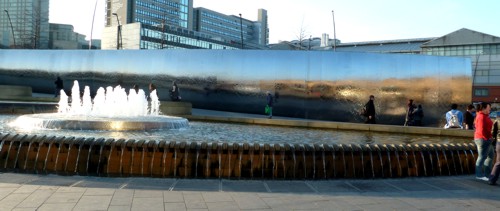
And my host had a rather cute dog.

|

|
24 March 2011, via Twitter I came across this chart. So sad.
27 March 2011. A bad day for bullshit. First I hear of a cancer charity that promotes ineffective treatments, collecting buckets of money on St Pancras Station. Felt obliged to write a quick post about A thoroughly dangerous charity: YesToLife promotes nonsense cancer treatments
Then heard via Twitter that the BBSRC has awarded prizes to four universities for their "impact". For example, University of Aberystwyth IBERS was the winner for “greatest culture change”. That would be this place Aberystwyth University to cut jobs at IBERS.
It is a great shame to see the BBSRC spending money on this sort of thing when many first rate research groups are dying for lack of smallish responsive mode grants. The BBSRC should spend less on self-aggrandising bullshit and do its real job, funding good research. Here are some responses from Twitter.
@stephenemoss
This is so depressing. RT @carlpnelson @david_colquhoun RT @research_uk: #BBSRC: Univ depts rewarded for impact http://bit.ly/fNQiys@carlpnelson
Epic, frightening levels of bullshit RT @david_colquhoun RT @research_uk: #BBSRC: Univ depts rewarded for ..impact http://t.co/F1K6HE7
They seem to sum it up fairly.
And see this Academic fury over order to study the big society.
. . a convention that for 90 years has protected the right of academics to decide where research funds should be spent.
Under the revised principle, research bodies must work to the government’s national objectives, although the Department for Business, Innovation and Skills said that ministers will not meddle in individual projects.
It is claimed the AHRC was told that research into the “big society” was non-negotiable if it wished to maintain its funding at £100m a year.
So much for localism. David “no-brain” Willetts turns out to be thoroughly dirigiste -central control of research.
Correction on 28 March. The AHRC denies this story. It seems that it is the Research Council that dictates policy from above, not the minister. I’m not sure that’s any better. On the other hand, the BIS document on Allocation of Science and Research Funding (December 2010) does mention the “Big Society” twice (page 22).
There is now a petition to remove political party slogans from the aims of Research Counciis.
There is now a timeline for the AHRC dispute
.
29 March 2011. The Pharmacology tea room has gone. The inevitable has happened. Now there is no place to meet colleagues in the whole medical science building apart from the rather small Starling Room. Sadly, the Starling room has not taken off: it is too far to walk for coffee for many people. Now, when you enter the building you are faced with a bleak sea of locked doors. I have emphasized repeatedly the importance of meeting people for the progress of science. I once wrote
“Second, drinking coffee with people cleverer than oneself is not a waste of time, but one of the best ways of expanding horizons. The ‘sandwich at the desk syndrome’ is not just unsociable: it may seriously harm your career.”
Although managers pay lip servive to this idea, they don’t act on it. The central academic staff common room has been reduced from three rooms to one (the Housman room) during a time when the College has increased greatly in size. Now even the Housman room is under threat. If one were conspiritorial, one could imagine that they don’t want academics to talk to each other -they might start to hatch plans. But cock-up is always more common than conspiracy. The more likely reason is that we are lead by people who have no idea how academia works.
30 March 2011. Another bumper day for bollocks, thanks to various correspondents who who send me interesting emails.
First I have forwarded to me email from Angela Hicks, the Dean of the College of Integrated Chinese Medicine, which awards a B Sc Hons degrees accredited by the University of Kingston.
Dear graduates and students
You may or may not like the work of Dr Masuru Emoto and the healing power of water – but anything to do with the Fukushima nuclear plants deserves our prayers… And maybe you’ll forward it on.
Angie
There is appended a message from Masaru Emoto (“Messenger of Water”) which says, inter alia,
“To All People Around the World
Please send your prayers of love and gratitude to water at the nuclear plants in Fukushima, Japan!”
“During over twenty year research of hado measuring and water crystal photographic technology, I have been witnessing that water can turn positive when it receives pure vibration of human prayer no matter how far away it is.”
“Energy formula of Albert Einstein, E=MC2 really means that Energy = number of people and the square of people’s consciousness.”
The Dean seems to take this quite seriously! In fact it seems to be all part of a racket selling cure-all “Vitalized Water”. You can buy a water jug and kit for $549 http://vitalizerplus.info/?p=1300
Then I find that, at a time when first rate research groups are struggling to survive, UCL is advertising for three more research facilitators, at a salary of £39k – £47k, one in arts, two in medicine. Meanwhile you could become a research associate in Spacecraft Orbit Dynamics, doing real science, no doubt on a short term contract, for £30k – £40k. Something is wrong with priorities here.
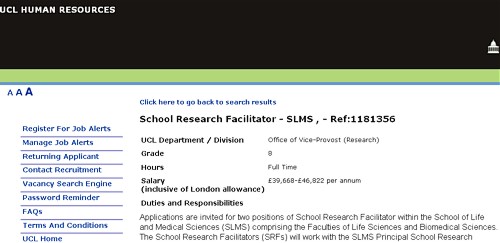
1 April 2011. Got a hilarious email today.
News: The announcement this afternoon of the wholesale move of the School of Life and Medical Sciences and its associated Faculties in 2013 will come as a surprise to many, not the least as it comes in the light of extensive posturing about restructure. However, this is a golden opportunity afforded College by the forthcoming availability of the Olympic park site, and the predicted demise of the University of East London (UEL) as it fails to justify its £9000 fees.
Firstly let us consider the advantages for Medical Teaching. UEL campus features large residences easily capable of housing the predicted 1100 per year Medical cohort as well as the other taught courses. The sink-estates of Stratford provide a clinically- and financially-disadvantaged demographic, allowing the students to practice both “front-line” medicine and FRP (fiscally-rewarding practice, uncharitably called Prescription-shaving by the Daily Mirror).
The Olympic Park site offers unparalleled opportunities for teaching, ranging from huge lecture spaces (imagine the Attic resonance of returning a “Gymnasium” to its original purpose), to the legion of tutorial spaces provided by practice rooms. It is expected that each of the Olympic discipline sites will be earmarked as an individual research hub, with the Administration occupying the Press Village and Communications centre. Onsite catering will already be in place, as will Staff accommodation in the form of the Olympic Village. There will be a full range of Staff benefits including heavily discounted West Ham season tickets.
Detractors may point at the capital outlay already spent on the Darwin and other refurbishments, but the Mayor’s Office along with BIS have already indicated that “money is no object” provided the site is occupied. It is expected that the Darwin will be taken over by the expanding Engineering Department as this will only require the installation of a few bridges and the removal of some end-walls, the exercise to be used by the Bartlett as “hands-on” architectural practice. The Huxley building will be given to the new administrative Section of Self-Promotion. Anatomy and Medical Sciences will be ceded to a new School (referred to by the Provost as the “Twin Grails”) of Entrepreneurship and Fiscal Acquisition.
While many may feel that the classical retro-ness of the buildings does sit comfortably with the modernistic “thrustingness” of the School’s remit, it is felt that the Mission Statement :”Respecting the Past. Espousing the Future!” should satisfy any criticism, though entrenched recidivists have already revised this to, “The nod and wink”. Indeed it is felt that the high ceilings present in these grand edifices will add sufficient timbre and gravitas to the meanderings of economic theorists.
A colleague commented “”but our mission statement is not respecting the past and espousing the future it is Fucking the past and endangering the future”. That’s what happens when academics are disempowered and demoralised. Managers please take note.
Peter Lawrence on research. Also on 1 April, but certainly not an April Fool, I got another excellent article by Peter Lawrence, of the Lab for Molecular Biology, The Heart pf Research is Sick. Read it and take it to heart. The sentiments have much in common with two other excellent articles, Philip Moriarty’s Reclaiming academia from post-academia), and Peter Lawrence’s Real Lives and White Lies in the Funding of Scientific Research. The latter has been downloaded 45,000 times.
6 April 2011 Had a good 45 minute talk with Mark Walport, Director of the Wellcome Trust. It was triggered by the Trust’s abolition of project and programme grants in favour of a smaller number of larger awards to a few elite scientists. One problem was that candidates were short0listed without taking references. I put it to him that he was overestimating the ability of scientists to rank applications outside their own field. He didn’t seem to agree entirely, but he did listen.
11 Aprli 2011. More reasons to love the NHS. A crash at breakfast time. We ran upstairs to find Margaret’s mother (aged 89) on the floor, OK but rather confused. Possibly for the first time in my life I dialled 999. The call was dealt with very efficiently. Within 10 minutes an ambulance had arrived, with three paramedics and a nurse getting experience. The senior paramedic was impressive. He asked sensible questions, and measured blood glucose (she’s diabetic), then whisked her off to local A & E. She seems to lost a lot of strength in her legs, She didn’t have to wait long to be seen by a doctor, bloods taken and so on. By lunchtime she was discharged with two walking aids and two gadgets to help her get up from the loo. Fast, efficient and, of course, free. The NHS is truly wonderful. Don’t let the Tories sell it off.
13 April 2011. Simon Singh arranged a meeting with the new director of the Science Museum, Ian Blatchford, and deputy director Heather Mayfield Our deputation consisted of Simon Singh, Alex Davenport, Marianne Baker and me. It was Alex’s blog on the science museum exhibit, and my post on the museum which followed it shortly, that caused the meeting. Alex had a follow-up blog too. I hadn’t realised that Simon had resigned as a trustee of the museum five years ago, in protest about the (dreadful) alternative medicine exhibit. I had various stonewalling responses to my attempts to pursue the matter out of the limelight, so eventually went public. After the blogs appeared, the Science Museum published a response which was, sadly, entirely vacuous. We had an excellent discussion, during which Ian Blatchford said he regretted the official response and changes to the exhibit are promised. there is an account of the meeting here.
14 April 2011.
The article about “wellbeing” that has been in gestation for many months, appeared at last on BMJ blogs. The next day I put on this blog a modified version eith more links to original sources, and a slightly undiplomatic preamble. UCL’s own Grand Challenge in Wellbeing employed a nice young man to interview people who’d taken an interest. We talked for an hour but the emollient document he produced at the end had no trace of my views. I suggested an emendation, which received support from one of the participants (but the support was in a private email and the source declined to repeat it in public). Another participant said that my paragraph should be removed. The final document will, no doubt, be cherry-picked in a way that wold be familiar to homeopaths. I find the substitution of PR guff for honest opinion rather distasteful.
Wellbeing could be better at UCL at the moment, as we try to deal with the possible loss of any usable staff common room. It seems astonishing that one should have to waste time on such an absurd proposition. We are suffering from some rather poor management, I fear.
15 April 2011. Yikes! I had an email that revealed an internal document from the University of Westminster, still by far the largest provider of degree courses in magic medicine, and the palce weger students are taught that amethysts emit high yin energy. It revealed that the BSc in Complementary Medicine is to close, and most of the rest of the courses are identified as being “at risk” because of “poor recruitment and high cost of delivery”. these include Integrated Health Scheme: BSc Complementary Medicine, Naturopathy; BSc Chinese Medicine; BSc Nutritional Therapy; and BSc Herbal Medicine.
I wonder if this could be connected with my recent Freedom of Information request for samples of teaching materials from all of their magic medicine courses. It is amazing news, and very gratifying. More details coming soon.
16 April 2011. Got a copy of the letter that I and many others signed. It appeared in the New Zealand Medical Journal, Call for doctors not to practice homeopathy or refer to homeopaths. Every little helps.
It was followed by a reasonable article in the New Zealand Star Times, Doctors warn of Medical ‘madness’ Fascinating to hear a New Zealand GP saying that she used homeopathy mainly for viral diseases in children. That sounds like homicide (again).
17 April 2011. Another letter, this time in Times Higher Education. This was also the subject of a news article by Paul Jump, Impact initiative will ‘corrupt thinking’, Nobel laureates claim.
Corrosive impact merits only dismissal (1 of 2)14 April 2011 Two years ago in this publication (“Modest revolt to save research from red tape”, Letters, 12 February 2009), we wrote to express our concern with the research councils’ new initiative now known as “Pathways to Impact”. Following meetings with Research Councils UK in January and July 2010, we met the new minister for universities and science, David Willetts, who asked for evidence supporting our request for the initiative’s termination and who also asked Alan Thorpe, chief executive of RCUK, to justify his support. Our paper, sent to Willetts on 8 September 2010, has been ignored. We have not seen Thorpe’s promised justification. We, the undersigned, believe that “Pathways to Impact” compromises UK academic research and wastes taxpayers’ money. Researchers have proved time and again that they can handle financial hardship, but complete freedom is essential. Recall Ernest Rutherford’s dictum: “When money is short, there is no alternative but to think.” The initiative corrupts researchers’ thinking, obliges them to prejudge results while planning their proposals and encourages them to aim for attainable goals. We urge researchers invited to review “impact” submissions to make responses such as “I am not competent to assess the future potential socio-economic impact of this proposal”. Indeed, we do not know of anyone who is competent in this respect. Acquiescing might offer short-term benefit, but the long-term damage could be irreversible. Donald W. Braben, University College London John F Allen, Queen Mary, University of London William Amos, University of Cambridge Michael Ashburner FRS, University of Cambridge Jonathan Ashmore FRS, UCL Tim Birkhead FRS, University of Sheffield Mark S Bretscher FRS, Cambridge Peter Cameron, Queen Mary, University of London Richard S Clymo, Queen Mary, University of London Richard Cogdell FRS, University of Glasgow David Colquhoun FRS, UCL Adam Curtis, Glasgow University John Dainton FRS, University of Liverpool Felipe Fernàndez-Armesto, University of Notre Dame Pat Heslop-Harrison, University of Leicester; Dudley Herschbach, Harvard University, Nobel Laureate H Robert Horvitz FRS, MIT, Nobel Laureate Sir Tim Hunt FRS, Cancer Research UK, Nobel Laureate Herbert Huppert FRS, University of Cambridge Sir Alec Jeffreys FRS, US National Academy of Science, University of Leicester H Jeff Kimble, Caltech, US National Academy of Sciences Roger Kornberg FRS, Stanford University, Nobel Laureate Sir Harry Kroto FRS, Florida State University, Tallahassee, Nobel Laureate James Ladyman, University of Bristol Michael F Land FRS, University of Sussex Peter Lawrence FRS, University of Cambridge Sir Anthony Leggett FRS, University of Illinois at Urbana-Champaign, Nobel Laureate Angus MacIntyre FRS, Queen Mary, University of London Sotiris Missailidis, Open University Philip Moriarty, University of Nottingham Andrew Oswald, University of Warwick Iain Pears, Oxford Beatrice Pelloni, University of Reading Lawrence Paulson, University of Cambridge Douglas Randall, University of Missouri, US National Science Board member David Ray, BioAstral Limited Guy P Richardson FRS, University of Sussex Sir Richard J Roberts FRS, New England Biolabs, Nobel Laureate Ian Russell FRS, University of Sussex Ken Seddon, Queen’s University of Belfast Steve Sparks FRS, University of Bristol Sir John Sulston FRS, University of Manchester, Nobel Laureate Harry Swinney, University of Texas, US National Academy of Sciences Iain Stewart, University of Durham Claudio Vita-Finzi, Natural History Museum David Walker FRS, University of Sheffield Eric F Wieschaus, Princeton University, Nobel Laureate Glynn Winskel, University of Cambridge Lewis Wolpert FRS, UCL Phil Woodruff FRS, University of Warwick |
It is just as well that I’m not any longer running a research group. Trying to protect people from nonsense coming from on high has become a full time occupation.
18 April 2011. At last, the Royal Society of Medicine has managed to print something sensible about CAM, rather than promoting it. Michael Power & Kevork Hopayian wrote Exposing the evidence gap for complementary and alternative medicine to be integrated into science-based medicine. It is a devastating analysis of the ploys used by advocates of magic medicine in an effort to conceal the fact that their treatments don’t work. It also points out the the NHS, NICE and the King’s Fund have all fallen for these tricks.
18 April 2011. Some of the FRSs in Life Sciences (mostly) and medicine were invited to meet the head of the medical school, John Tooke. At least he agreed to listen to those who are (or were) involved in successful research. His proposal for new faculties has been widely seen in Life Sciences as yet another step towards the dominance of clinicians. That’s an oversimplification of course, but not without truth. In my view, Life Sciences should not be part of the medical school at all. When I first came to UCL it was part of the now-defunct Faculty of Science, and that seemed more appropriate. The discussion has been made enormously more difficult by the recent separation of teaching and research, and the construction of oversized "research departments" with silly names.
It is the ever-increasing clinical dominance that has resulted in the neglect of large areas of biology that are not directly related to medicine. For example, UCL is not represented at all in some very important areas like plant sciences. And it is weaker than it should be in areas like ecology, despite the presence of a few good people.
19 April 2011. The provost’s newsletter repeats what he said last week, in response to a Sunday Times article that referred to university administrators as “pen pushers”.
.
“Remember, this refers amongst others to laboratory technicians, librarians, finance experts, registry staff, IT specialists and other experts without whom no university could hope to survive, let alone thrive. Similar arrogance is occasionally encountered amongst academic staff, not infrequently coupled with the unacceptable treatment of non-academic staff as if they were servants.”
Quite right. But I notice that the provost’s response singles out relatively junior people of whom I have very rarely been critical, and most of whom do a very good job. The ones that occasionally worry me are the very senior administrators who stray out of their area of expertise, and have been known to treat academic staff as troublesome servants. There is a rather important distinction between bullying your juniors (never acceptable) and criticising your seniors if you feel thay are not doing a good job.
22 April 2011.
|
Easter is here, The time for the christian sado-masochistic orgy. I find it very distasteful. The best escape was to walk, despite the unseasonable heat. The primrose (sadly rare now) was taken on 3 April. The bluebells, unusually early this year, were taken today.. |

|

1 May 2011. The new herbal regulations have come into effect. Radio 5 put me up against the herbal industry representative, Michael McIntyre (chair of the European Herbal & Traditional Medicine Practitioners Association). I was pleased to get the chance to debate directly with him, because he has been misrpresenting the evidence for years. See, for example, Some truly appalling reporting of science by the BBC. and Government lends credibility to quacks and charlatans. I was able, at last, to ask him directly, which herb had the best evidence for its efficacy. He repeatedly refused to answer: “I’m not going to get into detail”. Eventually he resorted to the argument that herbalists treat people not diseases. I pointed out that the MHRA-approved labels list all sorts of diseases. No response. He then misquotes Sackett, who did NOT say that experience was as good as RCTs.
McIntyre goes on to misrepresent the BMJ Clinical Evidence paper which, he says, shows that 46% of all treatments are not proven to be effective. It is hard to be believe that McIntyre is really unaware that a large proportion of those that were not shown to be effective are CAM treatments, herbal medicine and the like. Professor John Garrow has pointed this out (see, also Healthwatch). Either he doesn’t read the literature or he deliberately misrepresents it.
Then a caller came in to swear that Chinese Medicine had cured his prostate problem and his wife’s hair. Of course he hadn’t any idea of how is prostate would have progressed if he hadn’t taken the Chinese medicine. Luckily for him, he didn’t have prostate cancer (the people who take Chinese medicine for cancer are probably dead so they can’t appear on the radio). These people are difficult to deal with without appearing rude, by saying they are gullible and deceived. I tried. Interestingly McIntyre did not leap to the defence of Chinese herbs.
4 May 2011 The BMJ decided to print (a shortened version of) The A to Z of Wellbeing, after it first appeared as a BMJ Blog. [reprint]. The “related paper” was a review by the great Polly Toynbee of Barbara Ehrenreich’s book. Smile or Die, which I cite too [reprint].
More surprisingly, the same issue of the BMJ contained an article by a UCL colleague, Clare Stanford, with the title The NHS is right to fund homoeopathy.
5 May 2011 Had a visit from Linda and Emily Rosa, just after I’d written about their famous paper in More dangerous nonsense from the University of Westminster: when will Professor Geoffrey Petts do something about it?. See text and picture.
6 May 2011. The “vibrational medicine” fantasy, as taught at the University of Westminster has had yet another blow. I had an email that pointed out a site that plumbs new depths in fantasy physics. It’s on the PositiveHealthOnline website: A post there, Spirals and Energy in Nature, was written by Robert McCoy. He claims to have worked on microprocessor layout design, but anyone with school physics could tell that the article is sheer nonsense. In a way it is much more objectionable that the silly slides with coloured rays used in the Westminster course. McCoy’s post seeks to blind with sciencey-sounding language, that in fact makea no sense at all. Luckily my retweet of the site attracted the attention of a real physicist, A.P. Gaylard, who made a very welcome return to blogging with Fantasy physics and energy medicine. He dismantles the physics, line-by-line, in a devastating critique. This sort of junk physics is far more dangerous than the perpetual motion pundits and the cold-fusion fantasists. At PositiveHealthOnline it is being used to push pills that do you no good and may harm you. It is a danger to public health.
15 May 2011. The saga of defending the idea that staff at UCL should have a coomon room carries on. The petition at http://www.gopetition.com/petitions/saving-the-staff-common-room-at-ucl.html is going quite well. It is mind-boggling that it should be necessary to spend time to argue about the question at all. A senior colleague commented
“Moving the Common Room to 25 Gordon Square seems so wrongheaded though consistent with the contempt with which the present college senior administration seems to hold those who actually do the work of the College. The bogus consultations reflect the same attitude”
I fear that there is only too much truth in this gloomy interpretation. I see no reason why deans and other senior management people should automatically line up to defend every detail of a plan that was, after all, proposed by people outside the university. Yet that is what they seem to do. It is a confrontational style of ‘leadership’ that seems calculated to lose friends and alienate people. That is not a good way to lead anything.
17 May 2011. Drove to Leicester for Skeptics in the Pub. Good hospitality, good audience, a lot of fun.
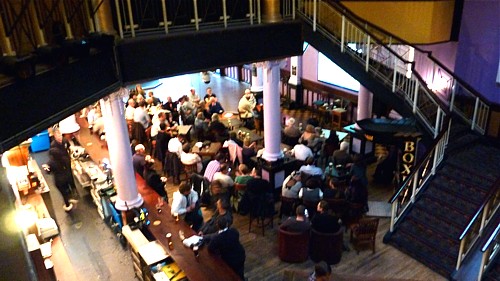
Next morning, drove on to Cambridge for Nicotinic receptor meeting at the Wellcome Genome campus, Hinxton. The talk should have been given by Lucia Sivilotti who has been leading the single ion channel group at UCL since 2004, but I’ll confess that it was fun to talk about science again. This year has been one long round of skeptical talks, which, I must admit, get a much bigger audience than ion channels. The meeting was fun, though I remain surprised about how few people are willing to do the work of analysing single channel records and continue to report uninterpretable EC50 and IC50 values. Perhaps I shouldn’t be surprised, because every academic scientist is under intense pressure to publish as much as possible, i.e under pressure to cut corners for the sake of speed.,
Picture taken near Hinxton by Roger Papke
22 May 2011 Sunday walk in the Chilterns. Rhododendrons were good.


23 May 2011. The ad hoc group of FRSs had a meeting with David Price (vice-provost, research). We had an hour and a half of good open discussion. Price is one member of the senior management team who will always talk, and listen. I wish there were more like him. It’s true that we have some differences, for example about the number of research managers we employ now, and the likelihood of the Grand Challenge in Wellbeing producing concrete outcomes in the real world, but I have no doubt that his heart is in the right place -with the people who do the work on which UCL’s reputation is based. We put a few ideas to him and await the results eagerly.
26 May 2011. First visit ever to Cumberland Lodge, in Windsor Great Park, for meeting of students of CoMPLEX (UCL’s Centre for Mathematics and Physics in Life Sciences and Experimental Biology). First half of the talk was about matrix formulation of single channel theory and maximum likelihood estimation. The second half (at their request) was about medical and managerial nonsense, particularly impact factors and the mismeasurement of science.
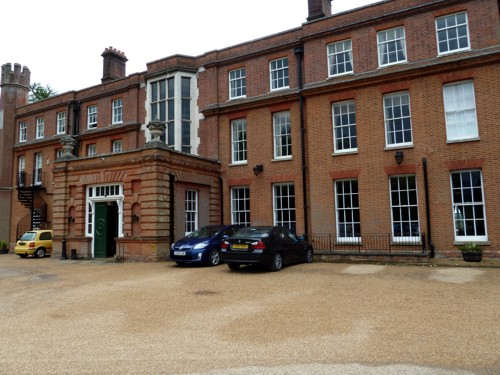
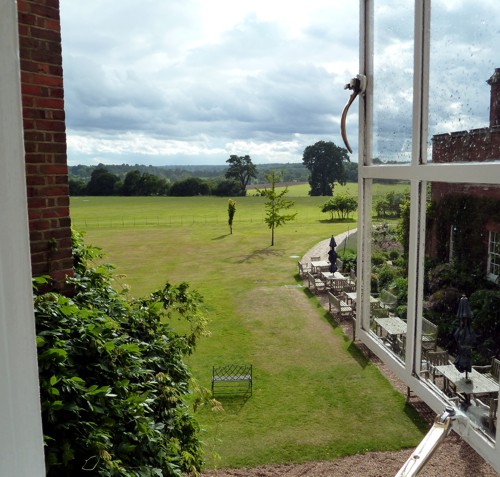
28 May 2011 Much time has been wasted on a row that should never have happened, the proposal to deprive UCL Staff of any usable common room. I understand that it is the job of good managers to get people on their side. If that is the case, the silence adopted by some senior people, and their refusal to give simple bits of information that are need for rational discussion, constitute very bad management indeed. Luckily the petition at http://www.gopetition.com/petitions/saving-the-staff-common-room-at-ucl.html now has almot 900 signatures, including two Nobel prizewinners and lots of FRSs and FBAs.
The person in charge of the internal newsletter at UCL, Peter Hart, declined twice to even mention the existence of the petition in his newsletter. Of course such attempts to suppress free expression misfire. The result is not to reduce the number of people who know about the petition, but to reduce the number of people who read his newsletter, which is obviously devoted more to PR than to news. The matter is now know to the world through a page-lead article in Times Higher Education.
After finishing that paragraph, I went to lunch and read this week’s BadScience column by ben Goldacre. It could hardly be more relevant. Children don’t need Brain Gym to spot nonsense describes several cases of children knowing better than adults but being censored by their elders. It starts with the story of a 13-year old schoolchild who wrote for the school newspaper a factual description of why Brain Gym is nonsense. But Instead of the pupil being praised for using their brain, the school banned the article because it would offend teachers in the junior school who use Brain Gym (the words credulous and moronic come to mind). For the schoolchild, read the academics of UCL. who are treated in much the same way.
This episode, though perhaps only of local interest in itself, has such wide lessons for the way that universities are run that I think it deserves writing up in detail, once the matter is settled.
The diary for June 2011 to May 2012 will now be continued on a new page.

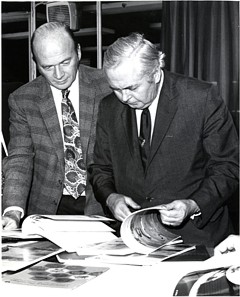

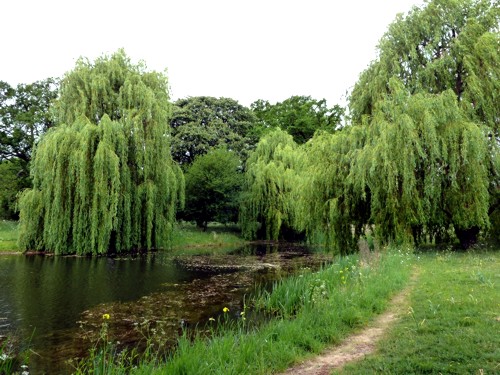


Was one of the interesting talks on the 16th by Richard Wilkinson, by any chance? His big idea is that the “health” of a society is related to the differentials in wealth/poverty rather than absolute wealth/poverty. He recently co-wrote a book called The Spirit Level about this and there was at least one book before that. I remember him from Brighton Labour Party (ah, those were the days …) – whatever one’s feelings about “wellbeing” (and I have been wondering myself) he is pretty genuine. I wanted to go to the talk but couldn’t make it.
@Jim GrozierYou are spot on.
That’s why I’n reading The Spirit Level at the moment. There is no trace of quckery in it, and it’s a great read. I also bought the book that tries to debunk it: The Spirit Level Delusion (not started on it yet).
All my political sympathies are with Wilkinson, but I can’t help thinking that, like all observational epidemiology, there is a genuine problem of causality. That matters especially for the politics -any proposed intervention will work only if it is based on a causal relationship.
Once I’ve got through it I’m planning to write something about it.
The other talk I enjoyed was by Costas Meghir, a UCL economist. Although less sweeping that Wilkinson, he is actually doing randomised trials of social interventions. They should solve the causality problem and so give real hope of finding out what works and what doesn’t.
[…] This post was mentioned on Twitter by Blue Wode, Alan Henness. Alan Henness said: RT @Blue_Wode: A brush of genius http://bit.ly/aXrP6t @david_colquhoun as you've never seen him before […]
Is it my imagination, or has Lynn Bindman painted your aura too?!
re: 17 September 2010
So that’s who he is.
I did wonder about that strange ex-nazi seemingly on the loose in Glasgow, and wearing a frock too!
Apparently his hat blew off. Then he was extremely rude about Britain and implied that non-believers are intolerant and bigoted.
WHAT?!!!
David, I’m truly sorry to hear about your wife’s cancer diagnosis. My own wife went through the same procedure earlier this year, and the Cambridge NHS acted with speed, efficiency and great humanity.
My wife is American, and she commented that it was unlikely that she could have got better treatment under the private healthcare in her native U.S.
Mind you, this is her second brush with breast cancer, so it’s unlikely that she could ever get health insurance in the States. That’s another reason for us to be deeply grateful for the NHS.
I wish you and your wife enduring good health.
[…] a few months past the first anniversary I tried a Diary page (modelled fairly consciously on David Colquhoun’s one) which I updated sporadically for a year before I ran out of steam around last […]
Good to hear the health news is encouraging for you and for Margaret, DC.
BTW, have you seen this?
“One reason for the dire situation is that Research Councls have been earmarking large sums for trendy-sounding initiatives. Only too often, this results in work being funded because it fits the narrow specifications of the initiative, rather than because it is first rate work.”
It’s been like that since the 1980s, when chaos theory was the “in thing” in applied maths, and you had to mention chaos in any grant application if you wanted it to succeed. Plus ca change, plus c’est la meme chose.
Universities, like governments, have sprouted mushroom-like crops of their own little quangos. Some of these are big enough to almost qualify as departments, others constitute no more than a few individuals. What catharsis if universities could follow the government lead, and have a quango cull.
How many people in the UCL Technology Transfer set-up, do you think, Stephen?
Of course, they might possibly be among the more useful add-ons, and they certainly do the sort of stuff that makes Tory Govts happy, but the Tech Transfer Depts are now so large in the Russell GP Univs – and staffed by such relatively “expensive” people – that I often wonder if they can possibly make back for the Univ anything like what they cost to run.
Good question from Dr Aust. At UCL the Tech Transfer office is known as UCL Business. My understanding is that UCLB is actually run as a semi-autonomous self-funding entity. As far as I know it does this quite successfully, and even provides funds for short proof of concept projects. I have myself benefited from a few of these, and all in all, I have to admit that UCLB is rather good.
That’s interesting. I would be curious to know how many Univs have managed to “spin out” the tech transfer into something self-funding. It certainly seems a better model than having it funded centrally via the Univ admin, which one would predict would lead to “bloat” (to put it mildly).
I think ours may also be (mostly) in a separate company. I don’t know very much about how it is financed, asw I’ve not had much to do with it recently, though I would be pretty surprised if it made back its own costs. I would hazard a guess it might be being subsidised via (e.g.) RDA funding (us being in a region!), or via rents that companies pay on “Business Incubator” space.
Funds for short proof of concept projects are definitely (speaking from a scientific perspective) one of the things you would ideally want from such a set-up. Again, don’t think they are that common. Our interactions with the local tech transfer folk (admittedly a few years ago now) tended to end once they told us:
David – I look forward to your piece on the ‘wellbeing industry’. It would be a good start to decide what it actually means. I’ve generally taken ‘wellbeing’ to be a curiously new-age way of saying ‘in good health’ i.e. ‘being well’. Yet the ‘health industry’ and the ‘wellbeing industry’ do not appear to be the same thing, suggesting semantic nuances that elude me.
Nevertheless, I am sure it is of the utmost importance that UCL appoints someone able to ‘coordinate’ activities in this area. Heaven help us if our wellbeing and intercultural interactions were found to be uncoordinated.
The UCL “Grand Challenges Coordinator” job ad (11th Nov entry) is truly priceless. I’ve read it through three times now and I cannot for the life of me work out what it is about.
Though weirdly, it does slightly tempt me to adopt an Austin Powers-type accent and yell:
A grad student today stopped by my office and told me she was studying for a statistics exam. I asked if she was doing a lot of problems, and she said that it was a psychology department course, and there were no problems for them to solve–they just used SPSS. I showed her my treasured 1971 copy of “Lectures on Biostatistics”.
Somewhere in my files I have a reprint request (remember those?) from DC for a paper I published on GABA receptors around 1987. I greatly enjoy this blog.
Cf. rick gray’s comment, my own first meeting with DC many years ago when I was a student, briefly described in a comment here, involved asking him a very lame data analysis/stats question, which he was polite enough to spend 45 min answering.
Has there never been a move to update and reprint Lectures in Biostatistics, David? Judging from our students, it is not a subject which is, er, all that well understood…
Just listened to the entertaining radio show discussion of acupuncture. The lady who insisted that her dog recovered and who believed she couldn’t be fooled by a placebo effect reminded me of a relative of mine. He claimed that acupuncture had helped him and when I suggested that it was a placebo effect, he scoffed saying “I know what a placebo effect is; it was not that”.
One might imagine that people like him – who think they can’t be fooled – would be more susceptible to a placebo effect. Anyone know if there are any studies on this?
Just catching up on your diary David, and wish you a quick recovery from the pain of the DVT.
As for the UCL “Grand Challenges Coordinator”, this (from the advert):
must surely have come from the keyboard of Terry Pratchett. What self-aggrandizing, pompous nonsense. Can they not see what a laughing stock they make of themselves?
David,
Is there any explanation as to how one is supposed to use this “matrix” (18 January)? It looks at first glance like a periodic table, from which one can infer likely properties of a chemical element. What, if anything, about “SLMS domains” (whatever they are) can we learn from this?.
@Chris
Nothing much that I can see, You can see it here http://www.ucl.ac.uk/slms/domains
I have asked Sir John Tooke for more details. So far he hasn’t replied.
I thought matrix management was last years trend? I actually like this one on the grounds , in my experience, that you end up with multiple managers all semi managing. Which can be entertaining and/or productive as with a bit of planning they can be left in a room arguing about what work i am doing when while i get on as i see fit.
Which does remind me of another point, although i am a private sector IT worker near enough every one of your comments about management and HR still applies (eg manager of a programming team stating “i dont really understand computers”)which i guess isnt suprising considering the push to bring in the “superior” private sector way of working everywhere.
Depressing though.
Terrible idea about the Housman Room. Even from two decades distance I have fond memories of after-lunch coffee and chat there, and in the quad outside on sunny days.
I am reminded of one of our Deans who made it his mission, over several years, to abolish all Departmental coffee rooms. Then they found no-one talked to one another, so they had to build the new lab buildings with coffee bars, now modishly re-christened as “Interaction Areas”.
*Sigh*
I haven’t heard this rumour about the Housman room. I’m not often on the main campus, but the Housman room is always where I meet colleagues when I come over. Any idea what is planned for the room, and by whom?
I know I’m a bit late but I just realised why that “matrix” thing seems so familiar.
http://www.ucl.ac.uk/medicalschool/staff-students/course-information/weave-1011.jpg
At least they’ve stopped trying to interweave the vertical and horizontal “components”.
So the AHRC has decided, independently of thought and entirely of its own free will, to prioritise research on the ‘Big Society’. It is a most remarkable coincidence that this comes just a few months after the current Government chooses the ‘Big society’ as its own tag line.
[Ed -this refers to item for March 30]
Kingston University are in good company regarding nuclear contamination – even Madonna has got into the act.
http://www.timesonline.co.uk/tol/news/uk/article614373.ece
Fortunately, there appears to be at least one Government official able to sort the wheat from the chaff.
[Ed. Refers to entry for 30 March]
David – I also noticed the new Senior Research Facilitator posts advertised in Nature this week. The job description states that “Primarily, the SRFs are expected to provide one-to-one support to researchers across the SLMS School developing applications for research funding.”
I know that grant applications have changed out of all recognition in the 20+ years I have been an academic, but I seriously question the need for bespoke facilitators to help us ‘develop’ (by which they probably mean ‘write’) grant applications. In the past 12 months I have written 6 successful grant applications, all without so much as a nanosecond of input from a research facilitator, but all with input from fellow academics.
As a young lecturer in Physiology, and long before anyone had dreamed up the notion of research facilitators, I sought advice from senior colleagues when writing grant applications. My colleagues were invariably as generous with their time as they were ruthless with the red biro. When asked, I now do the same for my junior colleagues, yet the growth of research facilitator posts would seem to suggest that the age-old process of mentoring by senior staff is either ineffective or obsolete.
I trust that these posts will be closely monitored to determine their cost-effectiveness, since an increase in the number of successful grant applications can be the only measure of their value – after all, they don’t teach and they don’t do research.
[Refers to April 1st item]
Yes, at a time of increasing redundancy threat, and campaigns to encourage academics to retire early, yet further bloat of “research facilitators” does seem odd. I too would love to know how it is established that these jobs are worth the money they cost.
On the April 1st joke, in the present circumstances I wonder how far-out the joke has to be to be clearly NON-plausible. When I stuck up my own April 1st piece, suggesting I would be taking early retirement to become a full-time chess player, I fooled a fair few of my academic friends and even one or two of my closest colleagues and collaborators….
[…] sponsored a “Festival of Wellbeing” that included a complementary therapy taster day. In a BBC interview one practitioner used the advertising opportunity, paid for by the NHS, to say “I’m an […]
[…] a “Festival of Wellbeing” that included a complementary therapy taster day. In a BBC interview one practitioner used the advertising opportunity, paid for by the NHS, to say […]
I have enjoyed immensely browsing through the material on this blogsite. I have particularly enoyed reading the various critiques of “impact” of one sort of another that are now being used to assess the “quality” of scientific research, since it’s a matter of close personal interest.
I am a muted but enthusiastic supporter of the sentiments laid out in the T.H.E. letter and those expressed by Peter Lawrence in his short pieces and by DC on the ‘how to get good science‘ page.
I fear, however, that it may be too late to stop the juggernaut. I have been surprised by the enthusiasm with which many of my academic colleagues have embraced the ‘impact’ agenda, particularly academic impact as ‘measured’ by various citation-based indices.
I worked for many years at the University of Queensland (UQ, a reputable Australian institution) and was witness to the initial development stages of the Research Quality Framework (RQF), the Aussie version of the RAE/REF. Published research output was (and now is) to be measured based on impact factor: journals in a field are ranked by IF and the ranked lists are divided into four categories: A*, A, B, C. These letters are clearly shorthand for Excellent, Good, OK (if you’re desperate) and Bollocks. The Australian Research Council requires grant applicants to indicate the ranking of their publications using these categories. Following the introduction of this categorization it has become pointless (if a job, research funding or promotion is what you’re after) to publish in a B or a C ranked journal (we all know what B and C mean, right?). In my field, this means that publishng in any journal with an IF less than about 3.5 is viewed as a waste of time.
Many Australian academics seem to ignore the obvious problems with rating quality based on the IF. Rather, they often use the ratings to denigrate the achievements of others, particularly junior scientists. It seems that the Universities are now taking things a little further – not only do they now use the journal rankings to evaluate people for jobs, tenure (continuing appointments), promotion, grants and fellowships, but the h-index seems to be appearing as a criterion for promotion. It would seem that UQ now requires an h-index of over 20 for promotion to the professorial level (though there’s no published documentation as yet).
I moved back to the UK a few years ago and was pleased to have escaped the consequences of this ratings scheme. Alas, it was not to be. Members of my department have Australian connections and learning of the Australian journal ranking scheme enthusiastically adopted it for the purposes of grading people within the department in preparation for the next REF.
It seems that whilst we may all agree that the best way to evaluate research quality is to solicit expert opinion of the content of research papers, no one can be bothered – not the academics and not the bean counters.
I may be being cynical, but a majority of academics appear to be mainly interested in their personal power and “esteem” and couldn’t care less whether ‘science’ suffers. Sites like this one reveal that there are people who do care – but are they/we in the minority, I wonder?
@JamesT
Thanks for your passionate and informative comment.
I had no idea that places like the University of Queensland sunk to the very worst method of assessment, crude impact factors, The facts about them have been known for years now (e,g. Seglen, 1997: or DC 2003) , and they aren’t even recommended for that purpose by the wretched Eugene Garfield who invented them. It seems that UQ must be run by people who not only can’t think, but can’t even read.
I’m afraid that your last paragraph has some truth. Fortunately I know many young people who have exactly the right idea about science. The corruption usually sets in later.
One tends not to hear much from these people, partly because they are struggling to keep up with research, teaching and HR bollocks. And, more seriously, they are often scared to speak out in case their honesty harms their career. That last reason is a particularly serious indictment of the way universities are managed. At least the ability to comment anonymously on blogs (as I notice you do) gives them some voice, and the existence of young idealists holds out hope for the future.
@David Colquhoun
I have to admit being ever so slightly ashamed of commenting anonymously on these matters. If there were only me to worry about, then I would ‘fess up without hesitation!
My experience with younger scientists seems to be much the same as yours, but it’s a worry when their senior colleagues are sowing the seeds of corruption right from the get go. It’s hard to resist and have a secure job in academia at the same time.
My ex-grad students and post-docs in Australia are in the thrall of journal impact factors. This is sure to wear down their resistance sooner or later. Eventually they’ll be comproming their principles and selling their souls as they shamelessly grub around for more citations and produce ever more dubious claims of economic and social benefits (hyperbole? I hope so!).
Once the profession has been corrupted by “impact” (citation-based or economic), then I think that not only will science suffer (as you have already eloquently argued), but all these degrees in pseudo-science will be allowed in ever increasing numbers. After all, this stuff has “impact”, right? Social impact anyway: people want it and there’s money to be made – it’s a great market for the Universities to exploit. It seems that the advocates of this stuff have depressingly little difficulty persuading the people who make the decisions.
Perhaps I have become a dessicated husk of pessimism and resentment . . . let’s hope so!
Meanwhile, keep up the great work.
@JamesT
I guess we just have to keep pressing the case.
The impact factors merchants seem to me to have much in common with homeopaths. Irrational, innumerate and interested in making money rather than truth or justice.
The homeopaths have suffered some severe defeats since the skeptical movement took off. Perhaps the same can be achieved in higher education. It won’t be easy, but it may not be impossible.
@David Colquhoun
I hope you’re right – I’m sure you are. I have sent copies of your article on how to get good science and some of Peter Lawrence’s related pieces to my colleagues in Australia – perhaps they’ll have some (dare I say it?) impact.
Re pen pushing, I don’t know whether it’s true in the UK (I haven’t been able to bring myself to look into it), but in Australia the financial incentives to become a “pen-pusher” are substantial. If you take a position as Dean of Faculty, for example, your salary is approximately double that of a Professor: about AU$300,000 plus car and a performance related bonus.
Academic staff don’t get bonuses, but Deans get bonuses if the academics do a good job as evaluated by research performance (see my earlier post) and teaching performance (apparently, if we do a good job then the Dean is responsible). PVCs get even bigger bonuses if the Deans are deemed to have done a good job and the VC gets a bonus if the PVCs have done a good job. So the people actually doing the work get nothing extra, whilst those making it difficult for us for us to do a good job get a big boost if we manage it – isn’t that weird? This seems to me to be even worse than what goes on in investment banking – at least they distribute the money out across all levels.
@JamesT
Oh blimey, as far as I know, the dean doesn’t get a bonus when we publish a paper. What a ghastly system!
From the practical point of view, it’s sad that people in the UK who are fed up with the corruption of science by managers have no where to escape. Seems it’s even worse in Australia. Who’d want to work under the conditions such as you describe? Hardly a way to attract talent.
@David Colquhoun
It’s seems to me to be strange that the impact agenda, assessment by numbers and bonus culture is taking over academia so relentlessly when so many high-profile people are publicly speaking out against it and most of the younger generation don’t seem to support it.
Another example that people might be interested in (from a Chemist) can be found here:
http://pubs.acs.org/cen/coverstory/8014/print/8014bard1.html
It’s Alan J. Bard’s Priestly Prize address from 2002 and makes many of the same points made yourself and Peter Lawrence (it quotes the passage from Szilard’s “The Mark Gable Foundation.”).
I find these attacks on ‘magic’ medicine very interesting and I wonder why some people feel so threatened by it. I believe in freedom of choice and freedom of speech, so the detracters have every right to their opinion, but then so do those who use these ways of healing themselves. If the drugs given out by doctors were all free of adverse side effects I could perhaps understand it, but personally I would rather take something that might work, and definitely won’t harm me, than something that might work, but might also cause me irreversible harm! Why make science into a religion? It is only ever one half of the picture!
@helen
I think perhaps you meant to post your comment here.
I’m baffled by why you (and many other defenders of magic medicine) say that I’m “threatened by it”. In fact all I am going is looking at what the obervations imply. In the case, for example, of acupuncture, are you denying that the observations made by Paterson et al show that doesn’t work to any useful extent, even as a placebo? If you are saying that. please point out what is wrong with my analysis.
Nobody is trying to ban any sort of alternative medicine, I’m quite happy to regard it, in the words of Ben Goldacre, as a voluntary self-imposed tax on the gullible.
I do think though, that alternative medicines should obey the same laws about truth in advertising as everybody else. Do you, Helen, think that is wrong? Should homeopaths be allowed to claim to be able to cure cancer or malaria?
It is totally mistaken to think that all alternative medicine is harmless. Herbs in particularly contain potent drugs (in unknown doses) and some can kill people, I suggest that you take a look at What’s the Harm before saying that it’s harmless.
The fact is, of course that there is no benefit that is totally risk-free.
I also wonder how long your principles would last if you had septicaemia, cholera or malaria. Do you refuse to have local anaesthetics at the dentist, on the grounds that they aren’t natural? I think we should know.
“I’m quite happy to regard it, in the words of Ben Goldacre, as a voluntary self-imposed tax on the gullible.”
D:<
In my view it's a sophisticated industrialised fraud capable of deceiving and harming a great many more people (and their children and pets etc.) than just those Goldacre and others believe deserve to be preyed upon.
[…] Authority ( MHRA) , the Health Professions Council (HPC), the Department of Health, the Prince of Wales and his reincarnated propaganda organisation, the "College of Medicine", the King’s […]
[…] a pharmacology paper in my first final exam at the end of my third year. The external examiner was Walter Perry, head of pharmacology in Edinburgh (he went on to found the Open University). He had previously […]